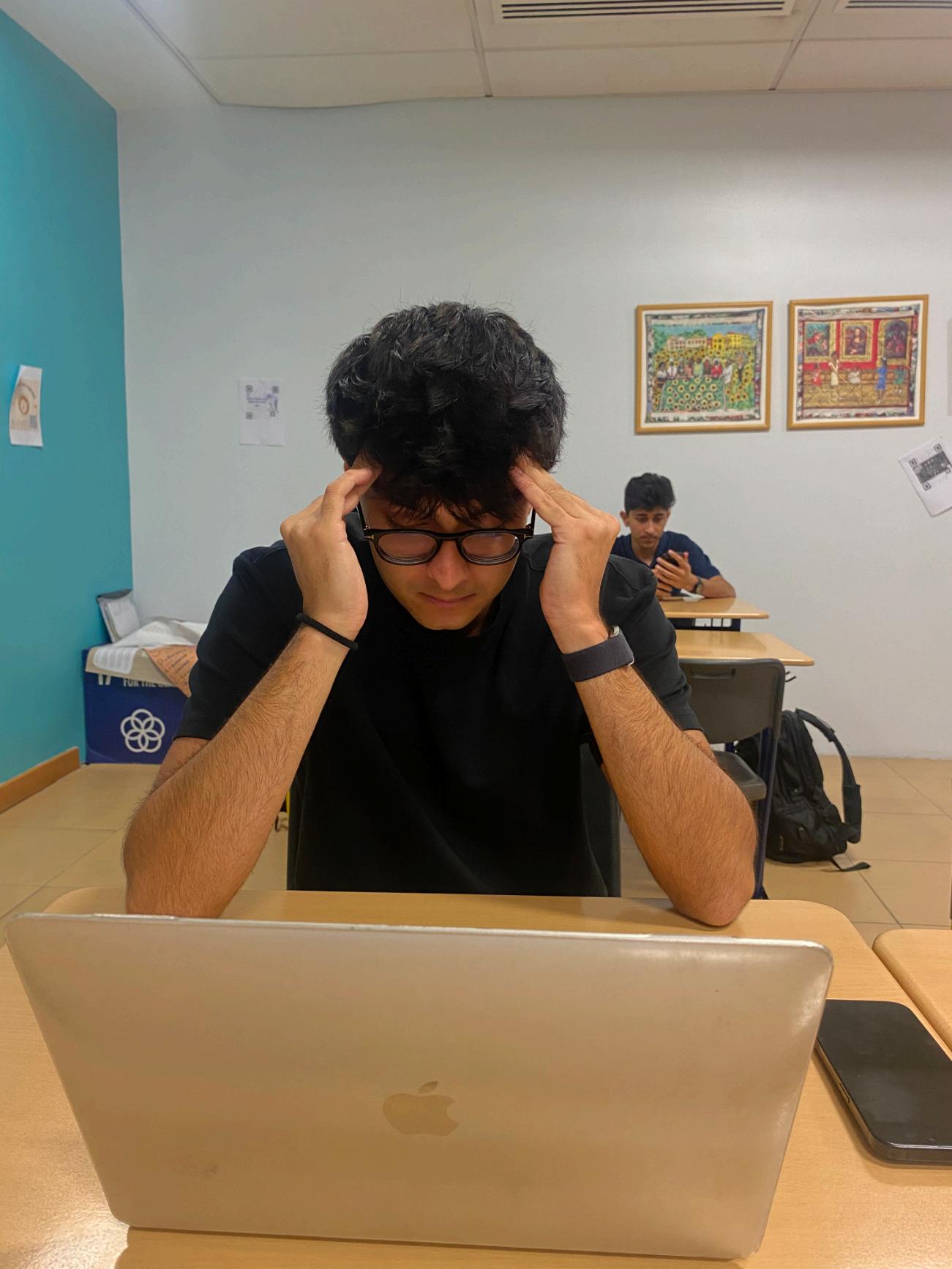




Senior Editor’s Letter
Editor-in-Chief of Our Hearts
Senior’s Beat
Senior’s Guide to Personal Growth: Finding vs. Losing Yourself in University - Sophia Khoury
The Final Chapter: Behind the Class of 2025’s Graduation
- Amaan Nagji & Samir Abdelfattah
Making Your Dorm Feel Like Home - Camila Vidaurre
Senior Dorm Recipes: Teacher Edition - Ayla Safar & Daanya Khan
Seniors and Their Siblings - Natalie Nelson Academics
Behind The Grades: How Stress is Affecting Students’ Mental Health - Dalia Farra
Senior Wisdom: How to Ace Academics - Juliette Schulze
The Culture of Hustle: Do ASD Students Feel Pressured to Overachieve?
- Muskaan Keni
Arts
Behind the Scenes: ASD at Short+Sweet - Aahna Lal & Karma Abdalla
Badminton: Beyond the Backyard - Arta Satari & Peter Parbhoo
Speech and Debate: Practice makes MESAC - Kamila Shah
Chasing Gold: An ASD Softball Feature - Maya Khoury
Progress and Growth: Track and Field MESAC - Mahad Rahman
Community
Why Our School Needs a Cafeteria Upgrade: Better Food Makes for a Better Experience - Kian Daryani
Shorter Days, Longer Nights: Balancing School and Ramadan - Lulu Ataya
Prom Superlatives - May Mutwalli & Nayla Jarmache
The Impact of Stress on Teens - Amalia Myers Giraldo

Dear all,
As the school year comes to an end, so too does my chapter as Editor-in-Chief.
When I took up the mantle in May 2024, The Akhbar was more akin to a gossip magazine than a true community newspaper. The challenges of COVID had eroded much of The Akhbar’s credibility and readership, and it had lost the communitycentered Falcon spirit it was meant to embody.
Now, a year later, I’m proud to say that The Akhbar has undergone an unprecedented revitalization and expansion. It is in a stronger place, and it stands once again as a voice for our school community.
This success is not mine alone. To begin, I want to sincerely thank Mrs. Bryant and Mr. Barnett for their constant trust, support, and understanding throughout my tenure. None of the success would have been possible without their unwavering guidance.
I am also immensely grateful to my senior editors—Deema Jony, Kenna Oden, Assia Klats, Yasmina Nemati, Iman Ahmad, Iyana Anderi, and Peter Parbhoo. Each of them played a vital and extremely under-credited role in bringing The Akhbar back to life. Their dedication and passion made all the difference.
I would also like to recognize the patrons who believed in our vision and supported wholeheartedly with spirit, guidance, opportunities, and information. These people include (but are not limited to) Dr. Druggan, Ms. Gruber, Ms. Jerabek, Ms. Theriault, Mr. Mailen, Mr. Buschini, Ms. Bender, and Ms. Backtash.
Lastly, I want to thank all of our readers, who embraced these changes, offered encouragement, and shared thoughtful advice throughout the year to make The Akhbar even better.
I want to end this letter by offering a piece of advice, especially to the rising leaders of our community:
True leadership is not about titles or positions; it is about service to a greater mission, a shared vision, and the community we are fortunate to be part of. Being entrusted to serve this extraordinary community is the greatest honor, and our highest calling is to give our very best each day, to move the mission forward, and to leave the community stronger for those who come after us.
It has been the greatest honor to serve ASD for the past three years.
Signing out,
Rui Yang
As our Editor-in-Chief signs off, we, the editors of The Akhbar, wanted to leave her with one last goodbye page flled with heartfelt messages. Rui, thank you for your guidance and the hard work you put into each publication. You've shaped The Akhbar into what it is today, and we’ll do our best to keep improving it. We’ll miss you so much. Good luck at Duke!
Assia Klats

Dearest Rui,
Rui, thank you for all of your dedication and hard work. You have truly transformed the Akhbar and set very high standards for all of our publications. We will always be grateful to you.
Mrs.Bryant
Rui,
Your unwavering commitment to excellence and amazing achievements as Editor-in-Chief are both commendable and inspiring. There are not many people who are able to manage the hectic life of school, extracurriculars, and an entire fsh community under the sea while still excelling at such a major leadership role. Thank you for all you have done to enhance and enrich the tradition and community that is the Akhbar - much of its success is a testament to your hard work. It still blows my mind that the MESAC Recaps are written and printed with a beautiful layout in real time, with such precision and detail, even on the smallest things, like someone’s jersey number. Getting to work under your direction has taught me more than you think, and I hope you carry on your intelligence, dedication, passion, and drive with you wherever you may be.
I will certainly miss you both in Journalism and Chamber Choir next year, but I am so happy for you and know you will thrive in the wonderful world of Duke! Keep being you, you are destined for great things!
Kindest regards, Aya
When I frst met you, I saw a person who had passion and drive, loving whatever you did. Whether aquaponics or contributing to other events around the school, you would always do it with one hundred percent of your effort and never back down.
Last year and the year before, the Akhbar was disorganized and decentralized (no offense, Ms. Bryant). People would call into question the quality since anything could be published. If this embodiment of the student voice was to survive, it was evident that it needed a strong, visionary leader. Thankfully, we got the best manager anyone could ask for: you. For the frst time, the Akhbar saw someone willing to take risks to transform the publication, earning the respect of the school and its students. Someone willing to sacrifce hours upon hours to ensure the ship was sailing smoothly. Not only did you show your drive even more during this role, but you showed that you could bring people together and push them to make the fnal product something that inspired people. The best thing is that even in such positions of power, you kept your humility through it all. Instead of falling into arrogance like others who lead big teams, you chose to be humble by listening to others to bring benefcial changes to this great magazine, not to stroke an ego. At the end, you not only changed the Akhbar for the better, but you changed our hearts and minds because of your dedication and sacrifce to protect our beloved Akhbar.
Overall, we hope to grow the fre you started with your endless dedication and improve the Akhbar even more. Because of your dedication to pushing people to do better and preparing future editors for this role, we hope to carry your legacy into further successes for a long time to come. Rui, we cannot thank you enough for the strong leadership you brought to the Akhbar, and we hope that you continue your “path to conquest” at Duke, which is incredibly fortunate to have a once-in-a-lifetime visionary like you. Once again, from the bottom of my heart, thank you for being a great leader, friend, and classmate, and I hope your future endeavors are as fruitful!
Mahad Rahman
Karam
Thank you for trusting me to be a part of your incredible Akhbar legacy. It was an honour to work alongside you. Your guidance, teachings and, passion for the Akhbar made everyone so eager to do their best for you.
Thank you for everything Rui, Cheers. Peter Parbhoo
Dear Rui,
When I started Journalism 1, I hadn’t tried journalistic writing before and didn’t even read the news. Journalism easily could have become nothing more than a single credit on my college application. Nevertheless, when I met you, I felt like I gained a whole new perspective. Your dedication to the Akbar inspired me, leading me to engage in a class that has now become a very important part of my life. For that, I am extremely grateful. I am in awe of how you managed your academic life, leadership roles, Chamber Choir, the Akbar, and personal projects. You managed to go above and beyond in all of your responsibilities, such as your incredible transformation of the Akbar. Even with all of these commitments, you still managed to be a kind friend to many. Even though I only knew you for a short time, you welcomed me into the journalism community, gave me advice, and were a helping hand whenever I needed.
So thank you, Rui, for the wonderful effects you continue to have on the ASD community, and for being my role model in my frst year of high school.
I wish you all the best at Duke!
Juliette Schulze
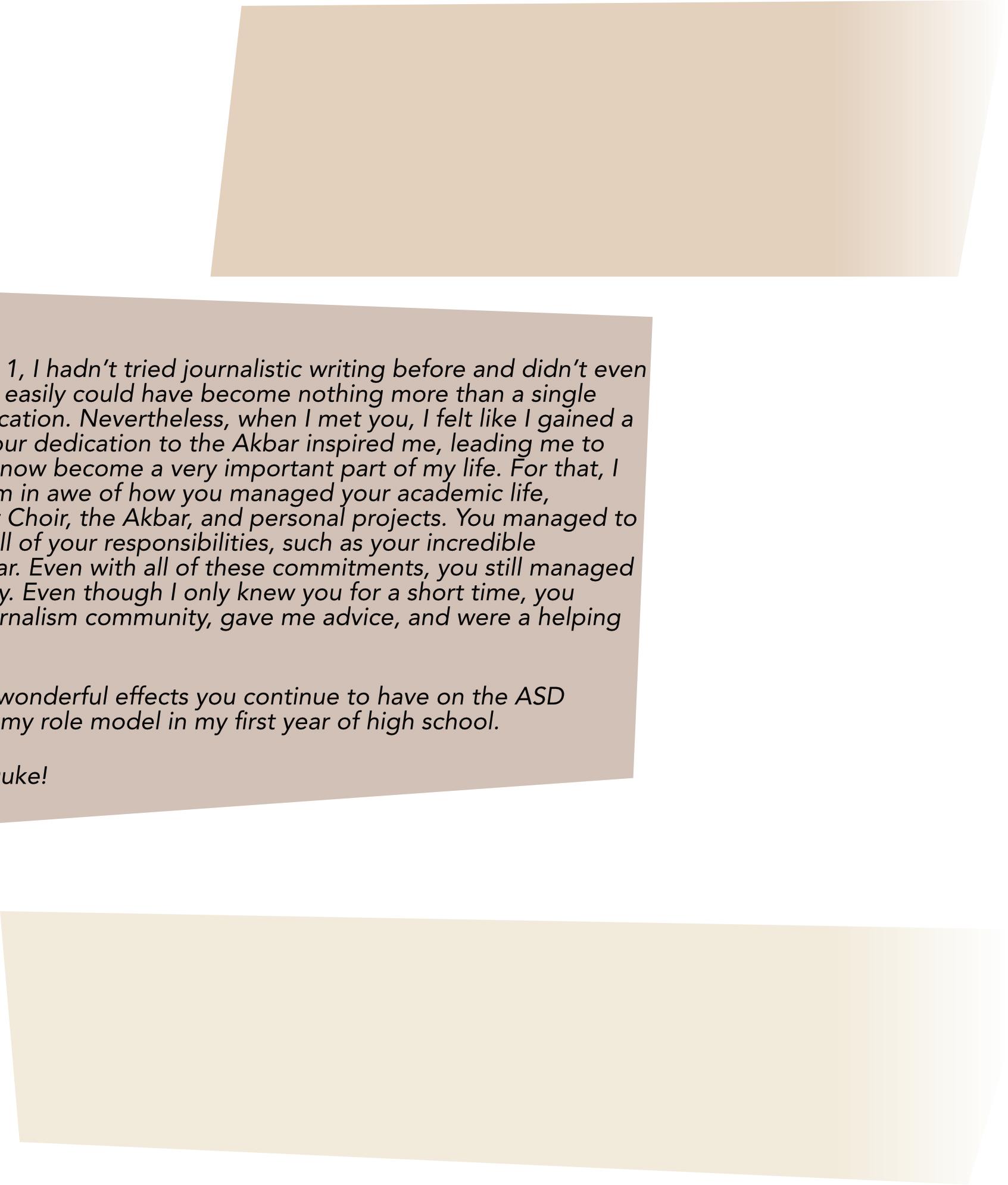
Rui, your hard work has brought credibility and prominence to our publication. Your expectations for the staff pushed them to achieve, and you have helped to establish the Akhbar as the standard bearer for high school journalism in the region. I hope you are proud of all you accomplished this year. I know you will fourish and exceed at all that life throws at you. Thanks for raising the bar; we will do our best to keep it there.
Mr. Barnett
Rui,
There are not enough words to explain how grateful the whole Journalism team is for you! You have spent countless hours every day ensuring that the Akhbar was produced to the highest standard and it has not gone unnoticed. In these past few weeks, touring the school with you has been such a pleasure, and it has opened my eyes to just how much work you do every day and the relationships you have built through these roles. The way that you were able to accomplish so much in one year and still manage your academics, extracurriculars, and leadership roles has left me in awe (seriously, no wonder your role had to be split into fve). I am forever grateful to have had you to guide me as an editor, even if it was a short amount of time, and I hope to keep your legacy strong by maintaining the high standards that you have left the Akhbar with in the upcoming years. You are an inspiration to many, someone we all look up to, and someone we will miss dearly. Have the best time at Duke! You deserve it!!
Aahna Lal
Dear Rui,
Thank you for being such an inspiring leader throughout the journalism class. Your passion, dedication, and creativity set the tone for all of us, and you’ve truly left a mark on the Akhbar. We’ll miss you and all the hard work you’ve put into journalism to make it the best it can be. Wishing you all the best at Duke, you’re going to do amazing things!
Ayla Hassan
Dear Rui,
Even though I came aboard the editing team just recently, it’s been genuinely memorable working with you.
You’ve truly left your mark on the school. Watching how every teacher lit up when you introduced us during your last week, how fondly they spoke of you while you were celebrating being “done” with the stress, it was so lovely to see. It honestly feels like you’ve been part of every aspect of school life; I deeply respect the way you managed it all. It’s honestly comical how your one job is now being split into fve. That alone is a testament to your dedication and the work you’ve done is something I’m in awe of.
What’s stuck with me most is your mindset. The way you think, about journalism, about science, about service, is inspiring. I’ll never forget the way you spoke about The Akhbar as a publication that exists to serve people. That sense of purpose is rare. You’ve transformed The Akhbar into something respected and meaningful, and that’s because of the heart and effort you’ve put into it. When you talked about studying science at Duke and described its purpose as a duty to others, it left a strong impression on me, hearing how deeply you believe in that mission. Not many people think like that anymore, and it made me want to adopt more of that lens in how I see the world too.
I’m genuinely honored to be one of your many successors. We’ll do everything we can to carry forward the legacy you’ve built. Thank you for everything! Best of luck at Duke, you’re going to do incredible things.
Muskaan Keni


“Don't cry because it's over, smile because it happened.”
— Dr. Seuss
By Sophia Khoury
Building a productive schedule for yourself, discipline, and creating your own path are essential to maintaining control over your time and decisions. College can feel overwhelming with all its distractions, so it's important to structure your time intentionally. Having discipline is the foundation for staying on top of both academic and personal life and helps you navigate the challenges University throws your way.
Creating your own path means staying true to yourself. This is your chance to carve your own identity, so don’t feel the need to follow the crowd or succumb to societal expectations. As much as the media paints a specifc picture of university life, know that your path is your own to create and fnd what works for you. Kimaya ASD’23, now studying at Boston College, shares her experience: “I thought joining an a cappella group was just going to be a fun extracurricular because I loved Chamber Choir at ASD. But it ended up being the thing that kept me grounded. Having that built-in community made such a difference because it gave me people to lean on when college felt overwhelming.”


At university, communication becomes more important than ever. Don't hesitate to reach out to your professor when you’re struggling or facing challenges that might affect your attendance or performance. A simple email or conversation can go a long way, and your professors might be more understanding and accommodating than you think. It’s good to differentiate yourself from the many other students in the lecture hall and some professors could even become mentors, helping you with a recommendation letter or with networking. Barnard student, Rosie ASD’24, reports, "They expect you to advocate for yourself. I had to get comfortable emailing them, going to offce hours, and making sure they knew my name which was intimidating at frst.”
It’s also vital to maintain open communication with your friends and family. They make up the support system that help you navigate this new chapter of your life. Whether it's sharing a laugh or confding in them, they can provide you with much-needed support and perspective.

Be mindful of who you let into your circle because sometimes the people who surround you can either elevate or drain you, and not everyone has your best interest at heart. You might connect easily with a lot of people, but you should reevaluate those connections if you’re always giving without receiving genuine care and respect in return. It’s okay to be selective because the people you surround yourself with will have a huge impact on your mental and emotional wellbeing. Choose people who uplift you and support your growth, and don’t be afraid to cut out anyone who’s toxic or draining your energy.
Your Time and Energy is Valuable
University life introduces many new people, but not all connections will be genuine or healthy. It's important to recognise that true friendships and relationships are built on trust, mutual respect, and shared values. Rosie ASD’24 says that, "Being at an all-girls school has been such a unique experience. It’s really empowering, but at the same time, you have to navigate a very intense social environment. I had to learn how to set boundaries, especially with friendships. Just because someone is always around doesn’t mean they’re good for you."

University life will present you with countless opportunities and people, but it’s important to focus on what truly matters. While it’s tempting to leave doors open, it’s essential to know when to shut them. Holding on to people or situations that no longer serve you only disturbs you own peace. Letting go clears mental clutter, and allows you to redirect that wasted time and energy to something else more important. According to Kimaya ASD’23, "Learning to say no is one of the most underrated skills in college. It’s so easy to spread yourself thin, but the real power comes in knowing where your energy is best spent. Not everything deserves your time, and that’s okay."
Remember, protect your energy by cutting out what isn’t aligned with your goals or values and surround yourself with a small group of supportive, positive people. The energy you put out will come back to you, so make sure it’s being channeled into the right places.
Good Luck Seniors!!
By: Amaan Nagji & Samir Abdelfattah
As the Class of 2025 approaches the fnish line, excitement and anticipation are in the air. Graduation is set for May 24th, the countdown has offcially begun. But while seniors are busy fnishing classes, wrapping up extracurriculars, and making fnal decisions about university, a lot is already happening behind the scenes to make sure their fnal moments at ASD are truly unforgettable. The administration has been working tirelessly to ensure a memorable send-off for this year’s seniors. Celebrations such as “Senior Final 50 Days” and “Red Envelope Day” are some amazing traditions at ASD that celebrate the
“As soon as we complete last year's graduation, we're already making bookings, we're thinking about the location… because it's not only graduation, right? It's like that whole senior week, and there are a lot of things that go into it”, said Ms. Jerabek.
Graduation is not just about the ceremony itself, it’s also about the traditions and events leading up to it. Ms. Jerabek mentioned, “We work really close with SGA (Student Government Association) and like, what are some things that you want to do this year? What's the legacy? How would you like to kind of personalize this experiment with this graduating class? And so they have a lot of input around things like senior last day”.

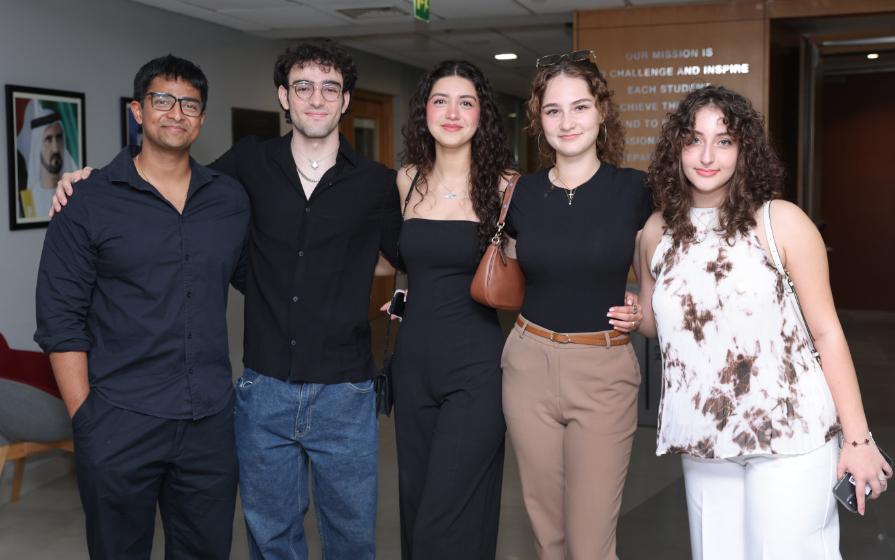
Source: Nida Alibhai
graduating class.
To learn more about how the big day comes together, The Akhbar sat down with High School Principal Ms. Kristine StampJerabek and Associate High School Principal Ms. Emily Theriault. They both shared insights into the planning process and all the love and care that goes into making graduation meaningful for every student.
“We've been working really deeply with the SGA this year to set up a Senior Fun Day. So there's some time for seniors to sign shirts, there's some activities for them to do. There’s a lunch provided, and we have that really fun activity that's being planned by the SGA, probably a slip and slide. You know, the things that seniors usually want,” stated Ms. Theriault.
Additionally, there are a lot of partners that ASD works with to pull off this event. The La Perle by Dragone, located in the middle of Al Habtoor City, has been ASD’s venue for graduation for the last few years. ASD works with a professional photographer and with “great community facilitators and those who have the senior parents, who have a lot of input, and they provide a lot of support. They help with the monthly senior lunches and all those different things that you know are a part of making the senior year really


Furthermore, Ms. Jerabek likes to refect on previous graduations to think about what can be improved. “Because it’s a tradition, we look back at what we’ve done in the past and try to make it better every year.”
Some traditions have become true highlights. One beloved aspect is the High School choir’s performance of “Lean On Me” by Bill Withers, a song that brings heartfelt emotion to every ceremony.
“Everybody loves that,” Ms. Jerabek shared. “It’s really become a tradition.”
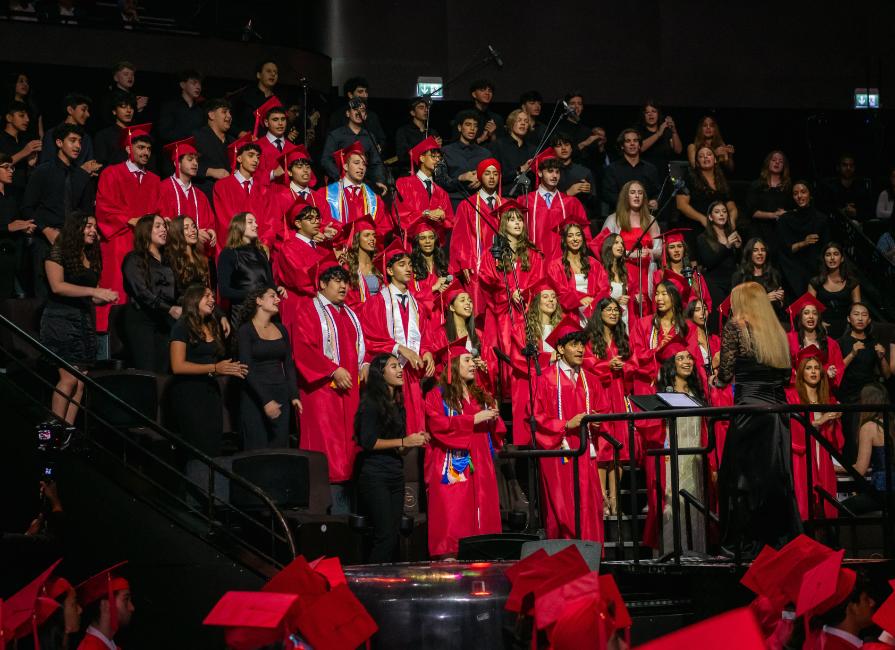
Another special part of the week is Senior Awards Day, held on the Wednesday before graduation. It features a class procession, speeches from student leaders, and a
heartfelt address by the class historian(s), seniors chosen to refect on the group’s shared memories. “They give a speech that commemorates the cohort and all the special memories that that group has gone through together over the years,” Ms. Theriault explained.
As the big day approaches, it’s clear that graduation is not just the end of something; it’s the celebration of everything that led up to it. Thanks to a committed team of educators, student leaders, families, and community partners. The Class of 2025 is on track for a sendoff flled with pride, tradition, and lasting memories.
But what does graduation truly mean to the students experiencing it? Grade 12 student Zaid Taqi shared, “I hope to experience an impactful, emotional, and memorable graduation ceremony. I’m certain that it’ll be a fantastic occasion where the entire class of 2025 gathers one fnal time. Some of my relatives are expected to come from Oman, which is very exciting and heartwarming. I know this is a memory I’ll treasure for years to come; I hope to make the most of this once-in-a-lifetime experience.”
For many seniors, the emotions are already kicking in. "I still can't believe my time at ASD is almost over," shared Alessio Nakani. “It’s been such a big part of my life, and I’m really going to miss it. Being on the tennis team was defnitely a highlight. From the early morning practices to the matches and just hanging out with the team, it’s been something I’ll never forget.”
Fellow senior Ayanna Puri echoed the same sense of nostalgia and excitement. “Leaving ASD feels like closing a really special chapter. I’ve made so many memories here, whether it was laughing in the halls with friends or just being part of a community that always felt like home.”
Both students are looking forward to the ceremony, not just for the moment itself, but for what it represents: one last time together. As Alessio put it, “It’s gonna be so cool to have everyone together one last time and just celebrate all the stuff we’ve done and gone through.”
Ayanna added, “It’s not just about walking the stage, it’s about celebrating everything we’ve done together. It’s crazy how far we’ve come.”
And that’s exactly what this fnal chapter is all about. The Class of 2025 will soon take their last walk as high school students, surrounded by friends, family, and memories that will stay with them long after they turn the tassel.




Turn a cookie cutter dorm room into a stylish and functional spot to live
By: Camila Vidaurre
One of the biggest changes when transitioning from home life to college life is going from a home to a dorm room. It is easy for dorms to feel life-less, cluttered, boring, impersonalized, and over all just not like home. Starting college alone is overwhelming, and having to decorate a whole new space can feel tedious and diffcult without guidance. Here are some of my top tips and suggestions for how you can take your cookie-cutter dorm room and transform it into a place of your own. I'll give you some ideas on how to spruce up your space, making it feel warm and inviting, as well as functional!
To get started, look at some inspo before hand. Pull up photos on Google, Pinterest, or Instagram to see what you do and don’t like. Think about how you want your room to look and feel, and consider what mood and color scheme feels enticing..
Many dorms only have a singular harsh ceiling light, which can often make rooms feel cold and institutional . Lighting can make a huge difference when it comes to making your room feel warm and inviting. Something you can do to cozy up your room is investing ion alternative and ambient lighting.

Look for unique lighting options such as a cool foor lamp, string lights, even or paper lanterns. Then, incorporate task lighting to accommodate activities like studying late while your roommate sleeps. This way, you don’t have to rely on a singular ceiling light, but rather use your own lighting to create ambience

Because you are living in one space, it’s important to be able to compartmentalize your room for different purposes. Making a study corner or a study spot can allow you to separate your work space from your living space.
If possible, position your desk near a window to get natural light and keep it free from clutter. Invest in desk organizers, drawer dividers, and a task lamp to ensure your workspace is functional and well-lit.
Adding plants to your room can instantly make your space feel more alive. Not only do plants add a touch of nature and color, but they can also help improve air quality. One study even found that a houseplant can help you stress less.
Look for plants that are easy to take care of like pothos, succulents, and the snake plant. I promise they won’t die! You could even get creative with where you want to put your plants. Hanging plants are a great option to spruce up your room without

housebeautiful.com
Start by Investing in a comfortable mattress and bedding. Good quality sleep is so important and defnitely something that should be prioritized, especially in uni. After that, you can make your bed your own by getting some fun bedding and pillows, and maybe even a throw. Pillow covers and throws can be easily changed out for a different look depending on what you feel like. If you’re like me and have a collection of stuffed animals, bring them! (or at least some)! Think about coordinating colors and textures to make your bed feel like your own.

cercolighting.com
Take advantage of vertical space by using wallmounted shelves, over-the-door organizers, and hooks. Under-bed storage is also a game changer. Buy a set of storage bins or use a lofted bed to create extra space for a dresser, desk, or even a comfy lounge area underneath.
Often times, university dorms come with furniture. Your frst impression may be that you don’t like the feel and look of the room or that it’s too ‘cookie-cutter’. Try your best to work with what you’ve got and don’t be scared to play around with arrangements. The placement of furniture can make a huge difference in how your room looks and feels. Move things around, maybe take some stuff out, add your personal touches, and your room will start to feel less cookie cutter.
Whether through photos, posters, tapestries, album covers, art pieces, or even jerseys, utilizing empty wall space is a great way to make your dorm feel like your own.
Consider making a photo wall to remember your friends, family, and pets you are missing as well.

By: Ayla and Daanya (and the teachers
“Buy a rice cooker, and you will never starve”
was the advice given by Mr. Coates when asked about what we should eat in college.
Will we starve… probably not, but let's try to enjoy our food. Below are recipes and advice from some of your favorite teachers on simple recipes that even the students who don't know how to cook can make in our dorms.
Our frst recipe came from a teacher you might see walking around the math

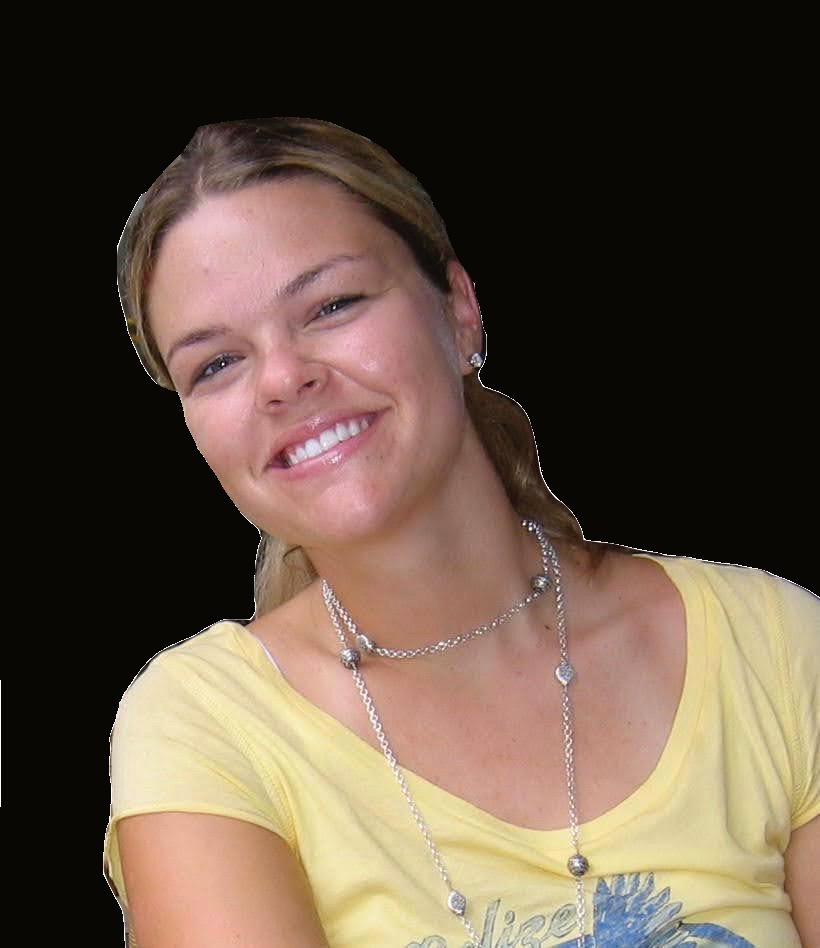
department, Ms. Haddad!! She went to the University of Kentucky, and although she said she ate only simple means in college, she gave us a nice one. Scan the code for Ms. Haddad's Stuffed Tomato recipe
Mr. Coates, everyone's favorite (and the only) AP Chemistry teacher! Although he always tells us to stop social loafng, he was able to social loaf in one of the nicest cafeterias ever, even comparing it to Hogwarts (no, we're defnitely not jealous…), scan for Mr. Coates 30minute curry (‘Kwikka Tikka Masala’):
Mr.Coates attended both Trinity College and Cambridge University! He described his food hall as an oakpaneled dining room with portraits around the walls and stained glass windows; if that's not similar to Hogwarts I don't know what is! Obviously, with such a beautiful campus Mr.Coates gave his frst college dorm a rating of 9/10 (let's hope that is what we seniors rate our dorms as well). He also decided to leave us seniors with probably one of the best pieces of advice, which is, “Buy a rice cooker, and you'll never starve.” - Thank you, Mr.Coats, we will keep it in mind!
Mr. Hurt, notorious for his sarcastic comments and jokes that may not

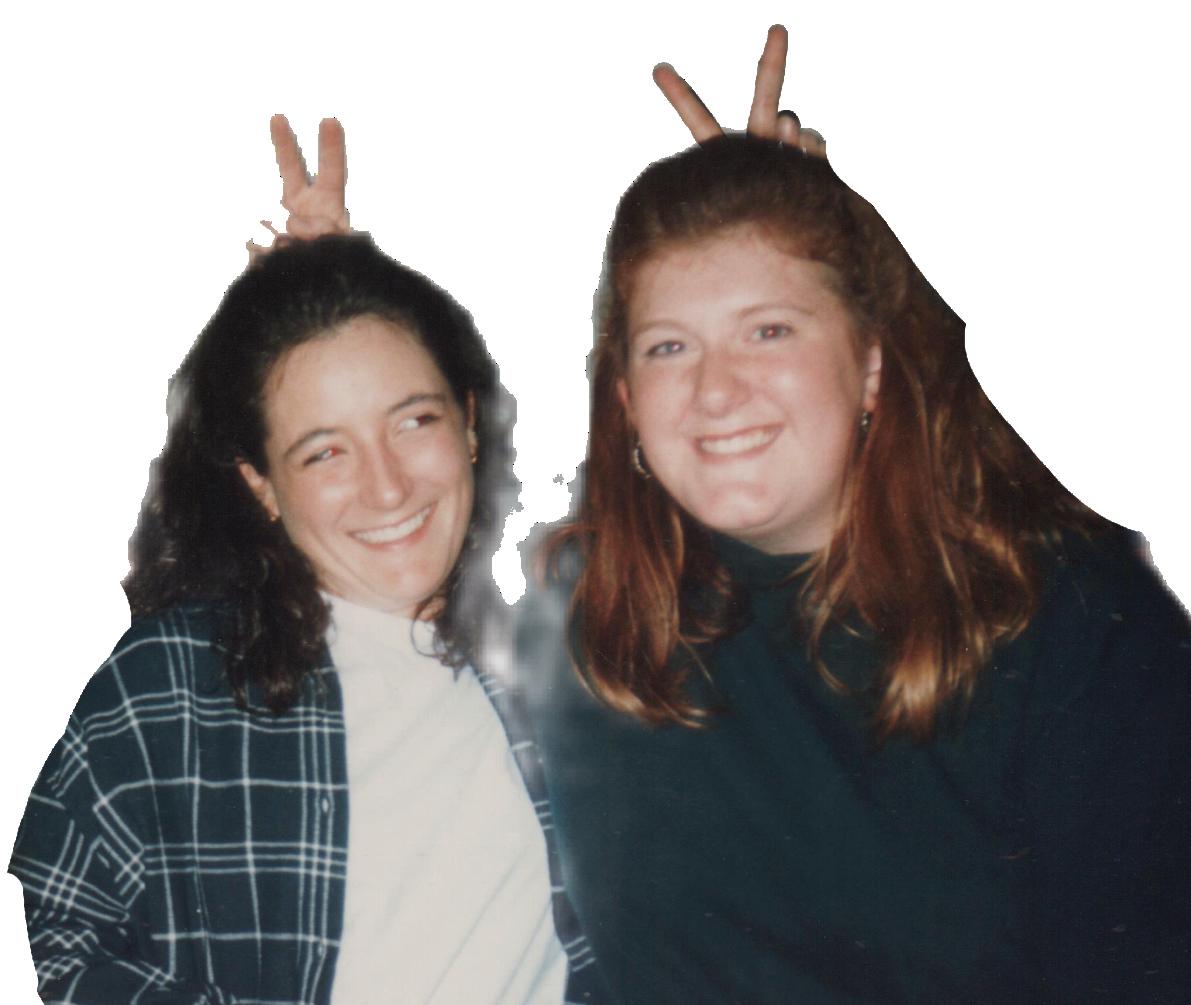
protein, and they're easy to make! Here's Ms. Harvey's mug omelet recipe
Do you know what a meal is that is loved across generations? Quesadillas! Kids love them, old people love them, and everyone loves them. Ms Hickey gave us a delicious quesadilla recipe that is sure to leave you happy.


always land, everyone's favorite British APUSH teacher, gave us the most British recipe of all time. Here is Mr Hurt's Beans on Toast Recipe
Mr. Hurt's college experience wasn't the most exciting - quite the opposite, actually. He attended Durham University (UK) and the University of Missouri (USA) and, unfortunately, rated his frst dorm a 1/10. His meals weren't great either: "For most meals, we just had a bowl of gruel (very thin, watery cereal/ porridge)." Beans on toast are defnitely a better choice than gruel—thanks, Mr.
When I think of an easy breakfast, do you know what I think? Waffes! Oh. Do we need to get a waffe maker in college? Okay... eggs are a good second option, I guess... But, in all seriousness, eggs are a great source of
So, what have we learned? Safe partying strategies, how to have fun in college, why we need to wear clothes with pockets. Let's all make sure not to starve in college and not to rely and Uber Eats as we do now and use these awesome recipes that our amazing teachers gave to us. Thank you so much to our teachers for these fnal lessons! We will miss you.


By: Natalie Nelson
“A sibling is a forever friend who knows you better than anyone else” (Moriarty). To some of us, our siblings are our guides, our leaders, our role models. To others, they are the people in their lives they strive to protect, and steer in the right direction. Either way, our siblings mean a lot to us, whether you’re the same age, or 7 years apart. However, there is a closeness that comes with a smaller age gap. More to relate to within your relationship; friends, interests, and school.
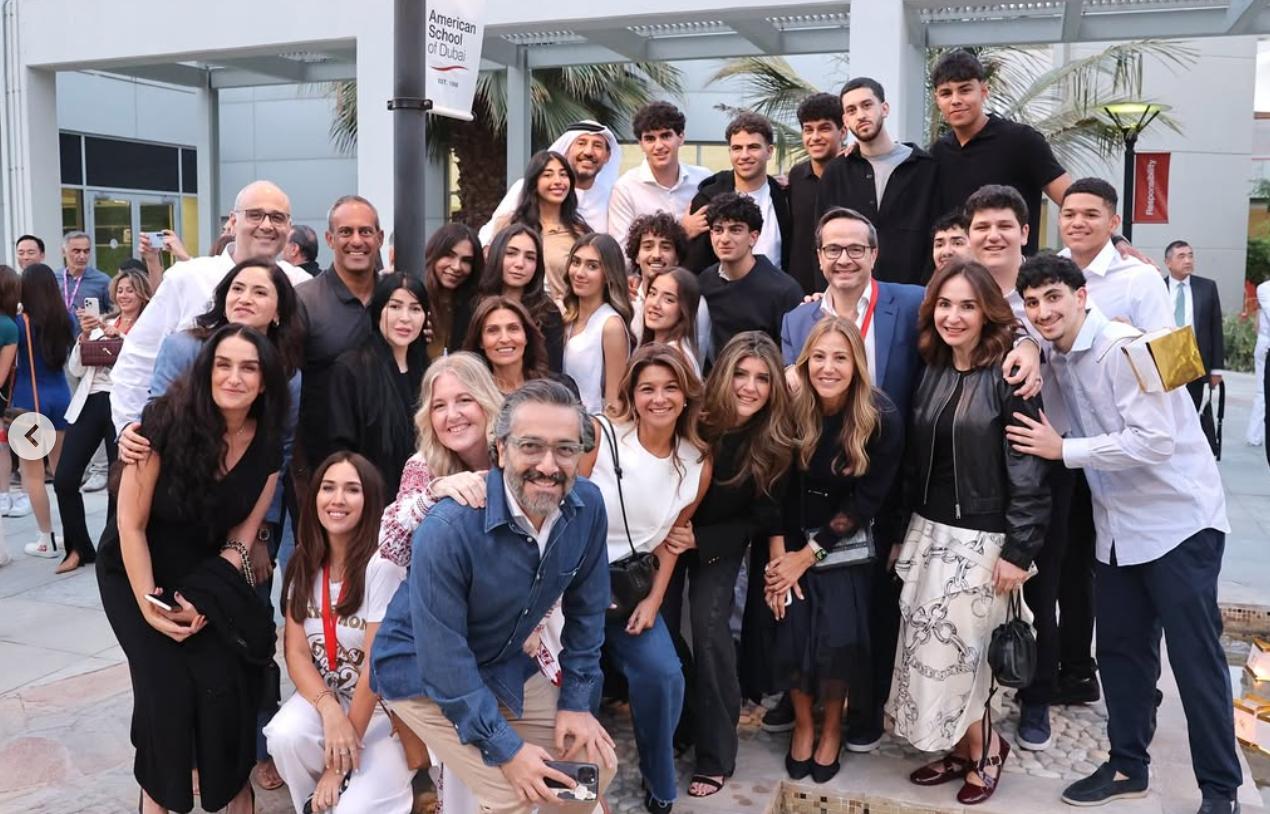
But with that closeness comes hurt when you inevitably have to go to college and leave them, or you watch your older sibling move on to the next stage of their life without you. Which is what makes these last 2 months of school so difficult for those sibling dynamics, especially if you are as close with your sibling as I am with mine.
Helping her set up her dorm, and getting on the plane without her by my side will be the hardest things I will ever have to do. If you don’t have a close relationship with your brother or sister in high school, think about these 2 months as a possibility to build one. They will always be in your life, it is up to you to decide how.
From the D you got on your math test, to the struggles with your friends, your older sibling has gone through it all, whether you believe it or not. So, with or without your knowing, younger ASD students, some of your senior siblings have some advice for you before they leave, to get through these rougher high school years.
Ava, to Dylan Werberg:
Don't worry about moving, you'll do great in your new school.
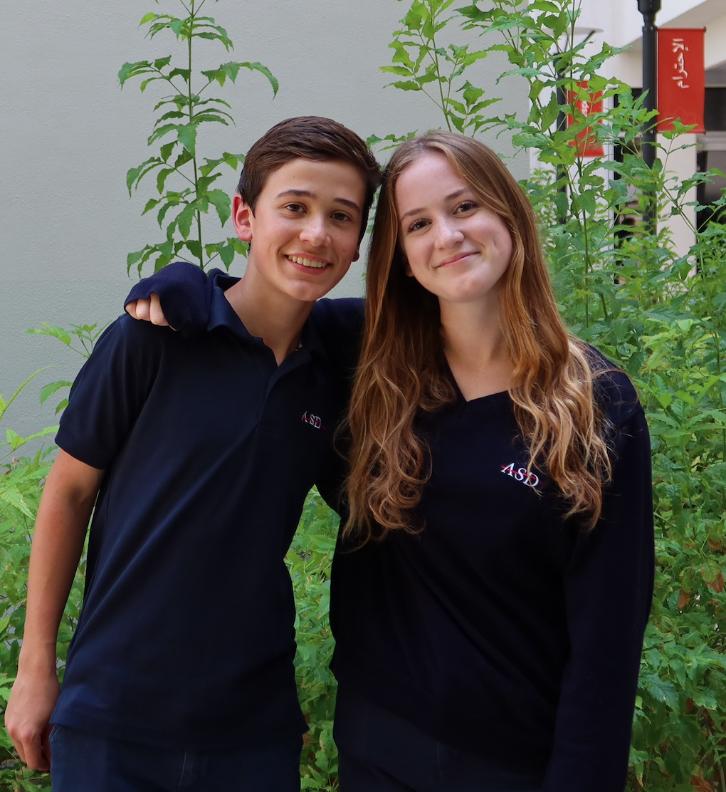

Natalie to Alex Haddad: Don’t stress just do your best now and everything will work itself out
Naiya to Kenza Ghazzawi: Don’t take high school for granted it goes by so fast.
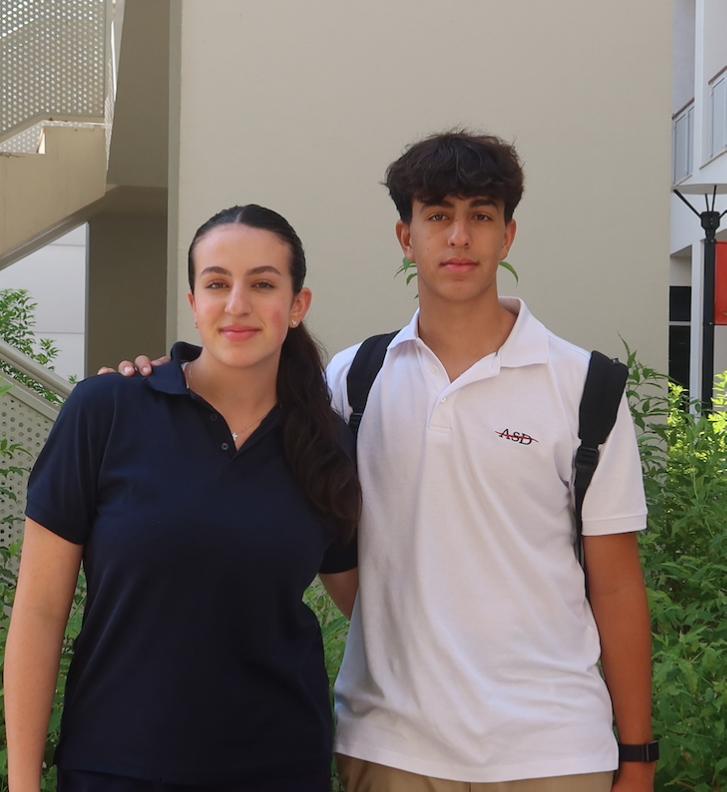
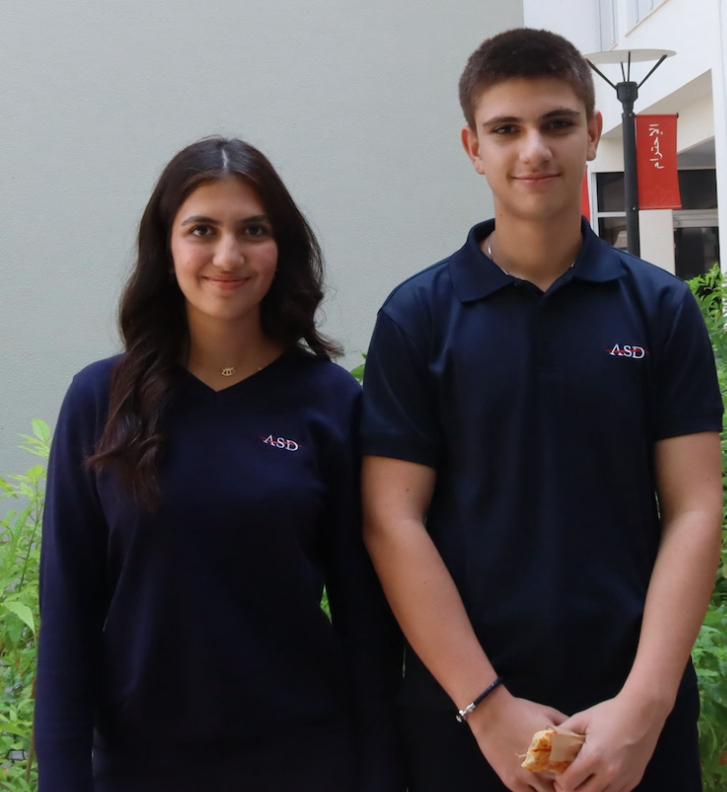
Michael to Leyla Kremers:
Have a high selfopinion of yourself, you're an amazing person and you need to believe more in yourself!
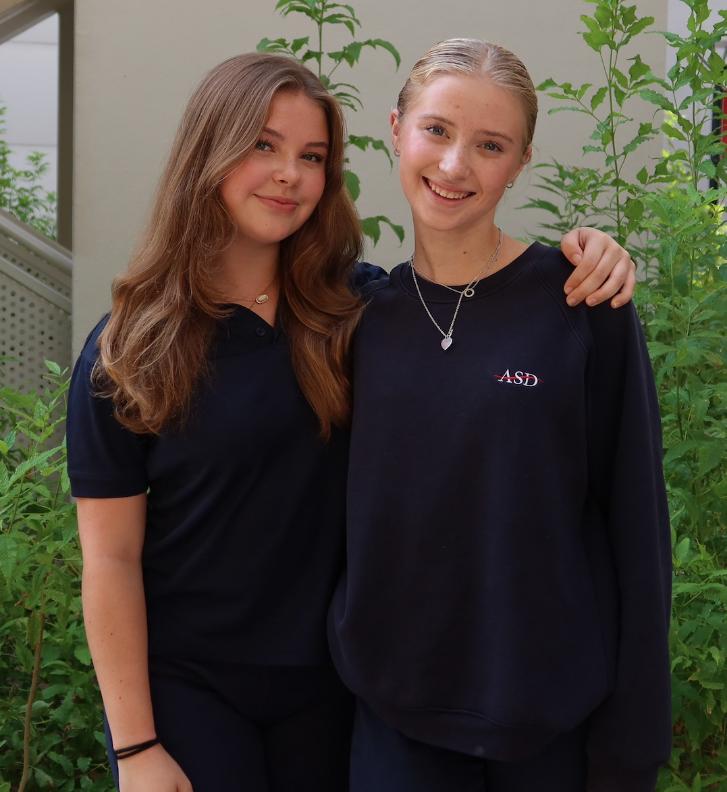
Emitis to Danyal Laghaee:
Enjoy every day of highschool because as cliche as it sounds it'll be over before you know it.
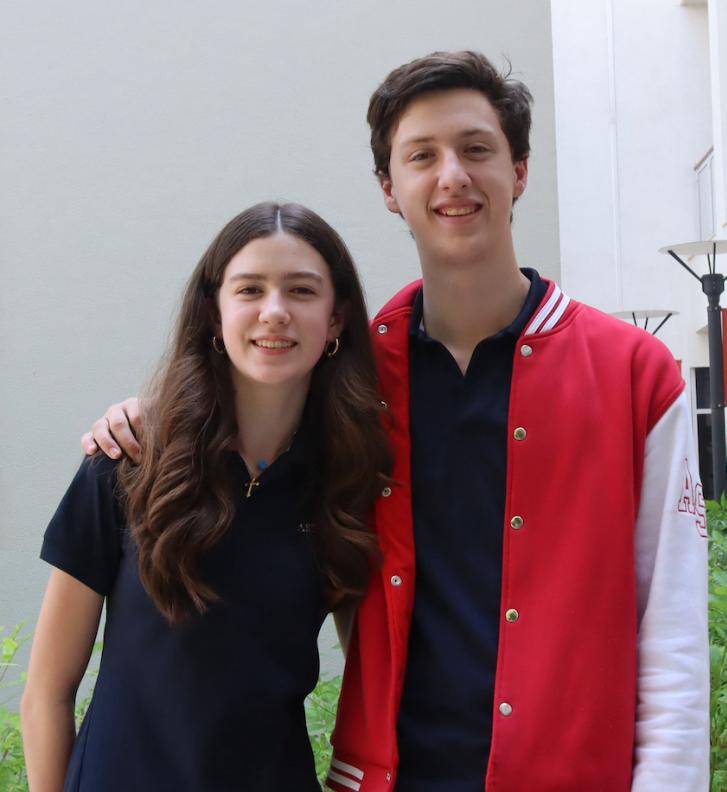
Taylor to Natalie Nelson :
If you have to seek out someone they’re not meant for you. You shouldn’t have to put in all the effort. If someone really wants to connect with you, they’ll put in effort as well.
Maya to Joseph Khoury : Take advantage of as much as you can. And try it even if you feel uncomfortable because you miss out on a lot if you don’t take chances.
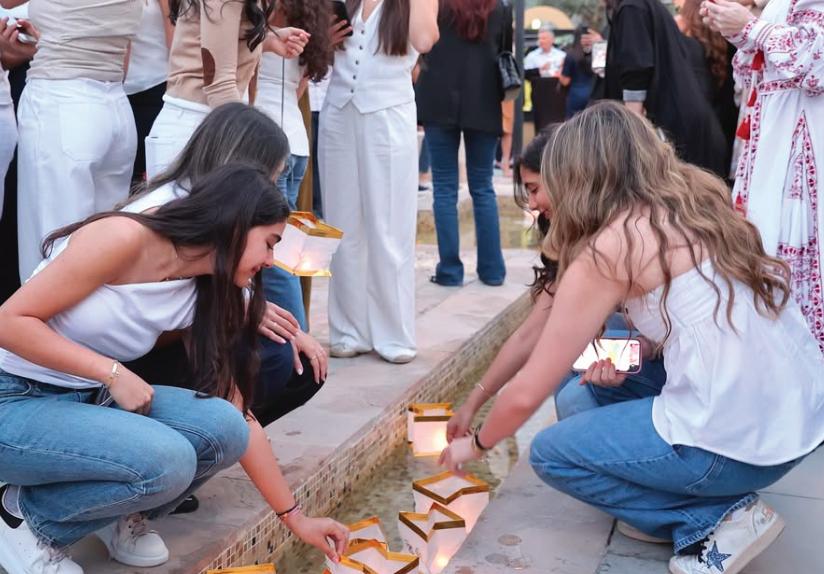
Your older sibling does really care about you, if you couldn’t tell from the advice they were able to give and chose to say to you. Even if these aren’t one of your siblings, take the advice to heart. They are the most experienced people in what you are going through, whom you are surrounded by each and every day.
So while high school may be rough, enjoy each little thing that makes you happy. It may not be school itself, but possibly just the time you have. And be thankful for the people in your life there to support you. Even if you don’t ask for it, they’ll be there for you.
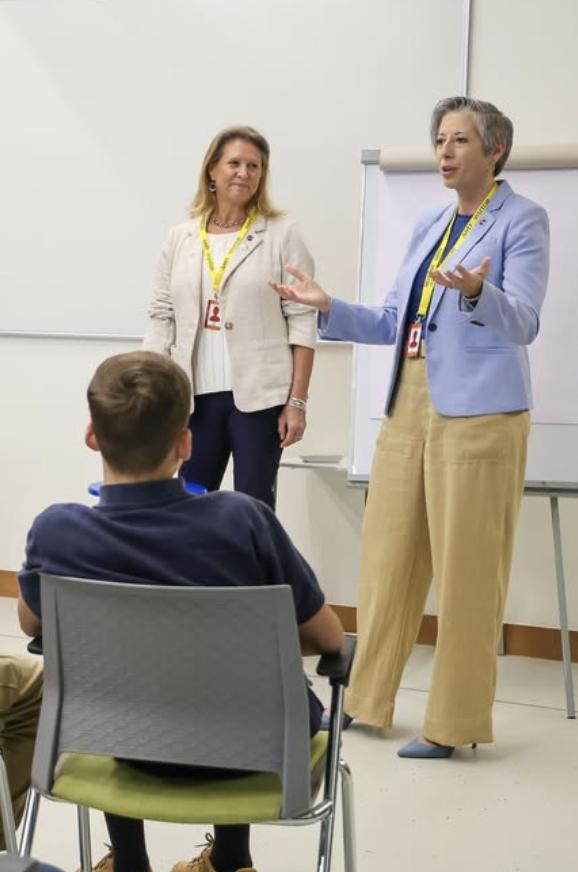
"Education is the most powerful weapon which you can use to change the world."
— Nelson Mandela
By: Dalia Farra
Have you ever been so stressed about school that your brain just shuts down? Like, no matter how long you stare at your notes, nothing sticks? Yeah…same. A lot of us are juggling homework, tests, sports, and trying to live a life, and it can get super overwhelming. Stress, anxiety, and burnout are way more common than people think, and they can seriously mess with your ability to focus and do well in school. That’s why taking care of your mental health isn’t just important - it’s necessary. When you feel good mentally, everything else gets a little easier.
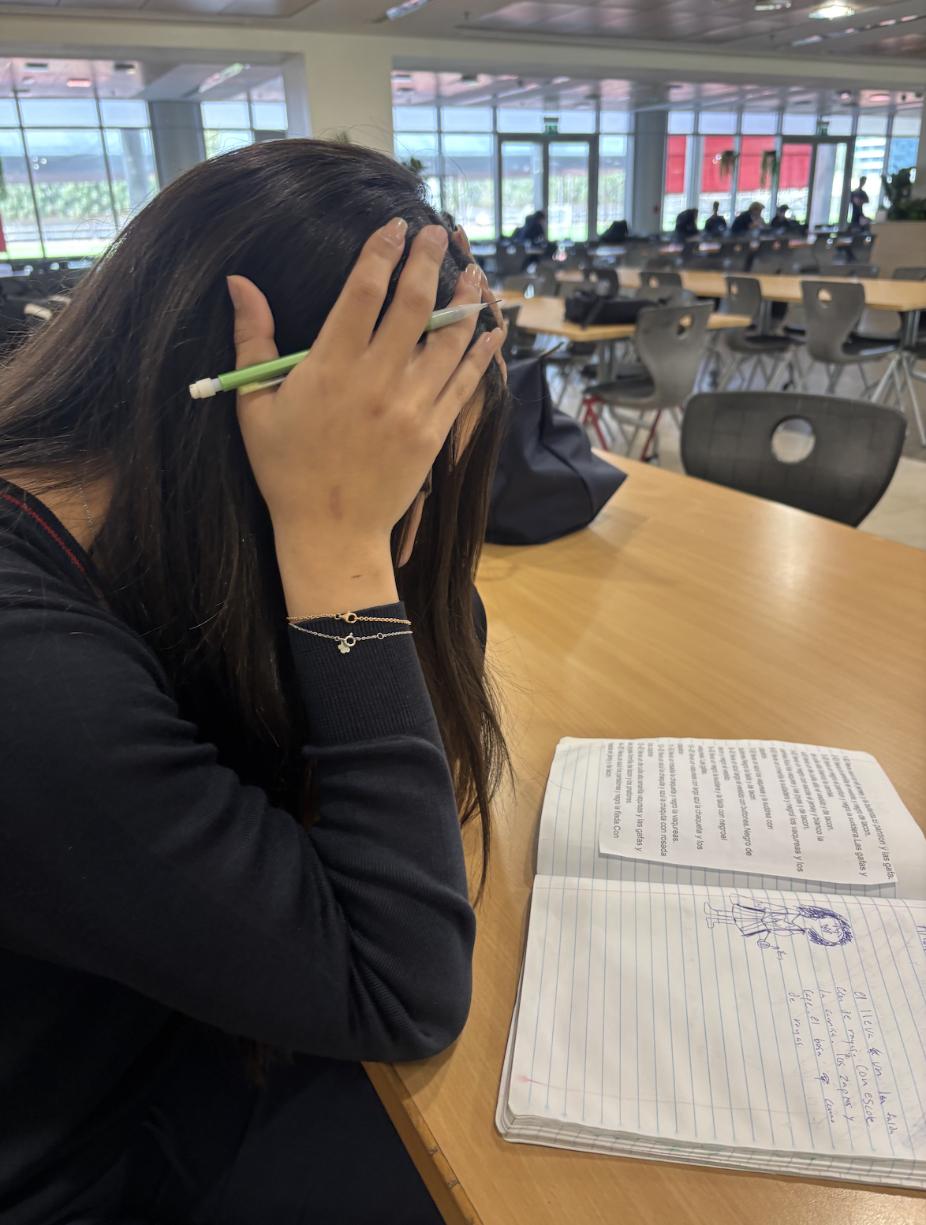
Source: Dalia Farra
Lately, it feels like everyone’s talking about mental health - and honestly, it makes sense. A lot of us are stressed out trying to keep up with school, sports, clubs, and everything else going on in life. There’s always another test to study for or assignment to fnish, and it can get really overwhelming. Some days, it feels like no matter how hard you try, it’s never enough. Studies even say teens are more stressed during the school year than most adults! Some schools are starting to help by ofering things like mental health days, but a lot of students still feel like they’re dealing with it on their own. That’s why it’s so important to talk about how mental health afects us at school - and fgure out how we can make things better.
I sent out a stress and mental health survey to students in grade 9, and the answers were pretty eye-opening. Most people said they feel “stressed and overwhelmed”, especially during test weeks or when there’s a lot of homework.
One response stood out: “When I’m in a test, I tend to blank out. I get so stressed that the words are like alphabet soup in my brain.”
One student said, “It really overwhelms me when I have a lot going on. Especially being a student athlete with less time.”
Another shared, “I feel like I want to skip school!” The biggest sources of stress were tests, grades, and homework. A lot of students also shared what they wish teachers understood. One person wrote, “We can’t always fnish all the work for their class because we have other assignments, too.” Another said, “They care about our attention in class but not why were tired or can’t focus.”
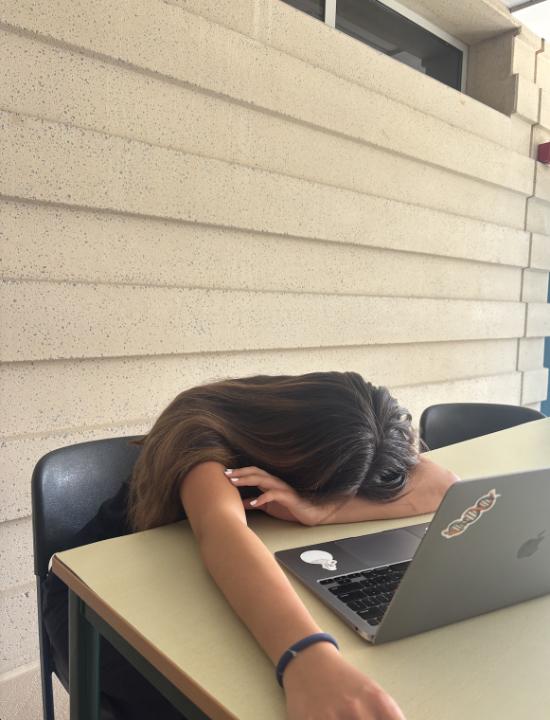
Source: Dalia Farra
On a scale from 1 to 10, most students rated their stress between a 7 and 9!
Almost half, 43.8%, said they’re at a 7, 31.3% said 8, and 18.8% said 9. Only one person picked 6, and nobody rated their stress lower than that. Plus, 87.5% of students said mental health isn’t talked about enough at our school.
It’s clear that many students are dealing with stress, anxiety, and burnout, which makes it harder to focus and do well in school.
Balancing school, activities, and life outside of class isn’t easy. The survey shows that students want more support, like less homework, more time to study, and teachers understanding the pressure we’re under. Mental health matters just as much as grades, and taking care of it will help students succeed not just in school, but in life too.
By Juliette Schulze
Tony Robbins says, "If you want to be successful, fnd someone who has achieved the results you want and copy what they do”. This is true of high school, where seniors can be exemplars and mentors for younger students needing academic advice. Studies have shown that when individuals of different ages are in a mentor-like relationship, older individuals can have a meaningful impact on younger individuals because of their expertise and knowledge. In stressful environments like high school, it’s imperative to fnd a knowledgeable person, or people, to give you advice when needed. Seniors are perfect for this as they have recently lived out everything younger high school students are going through – and have gotten through it. Whether it’s homework, course selection, tests, or any other challenge high school presents, seniors have wisdom to share that can be incredibly helpful for younger high school students.
Homework is a major source of stress for high school students as it can seem like piles of homework have to be done each week. In a form taken by the seniors of ASD, students recurrently recommend avoiding procrastination and getting the most important homework done frst. Sheamus Warren, an ASD senior, says this about homework, “Stay on top of the work, don't say I'll catch up later, instead do your work every night”.
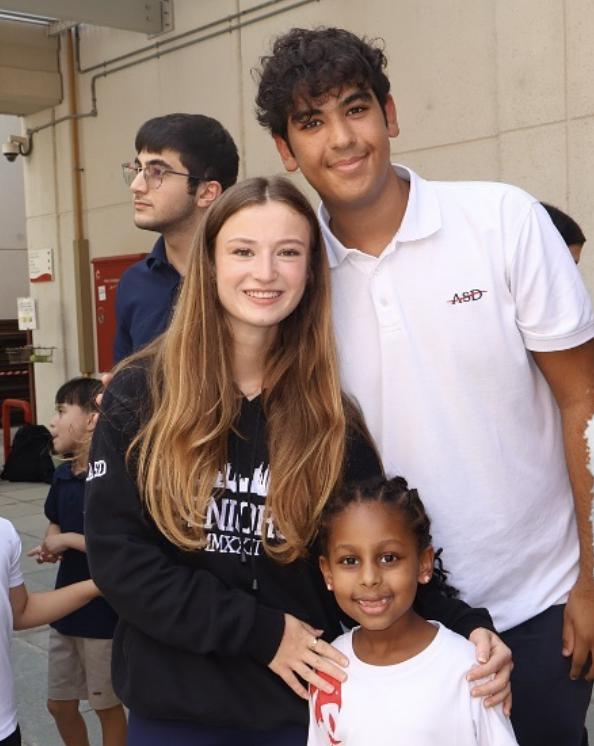
Another crucial factor of high school is course selection. With the plethora of classes offered at ASD and credits in need of fulfllment, it can be hard to choose which ones to take. Taylor Nelson says this about choosing classes, “There's nothing I would really recommend or not recommend because it all depends on what you want to do later in life and what you’re interested in.”
There's just a certain course path that works for you and a path that doesn't. – Taylor Nelson ‘25
Additionally, a big decision involved in course selection is what, if any, APs students take. AP classes are signifcantly more diffcult and often include a more serious workload, making it imperative to take time to consider them before joining one. Ava Werberg advises taking APs in classes you're interested in, as you’ll be more engaged with the learning, therefore making the class easier for you.
Studying and taking tests, such as the PSAT, SAT, or ACT, is another signifcant part in one’s high school journey. In the form sent to ASD seniors, test advice revolved around getting enough sleep, not procrastinating while studying, and not being too hard on yourself. Standardized tests can be intimidating, and even more so when they include specifc topics you struggle with. Senior Ava Werberg gives advice about what to do in such situations, “My advice is if you really struggle with [a specifc topic], take the ACT instead, because that's what I did. I really struggled with math on the SAT, so you take the ACT because it has more topics, so math matters less.” Above all, Ava says, “Don't stress yourself out.”
Work hard, but don’t place too much pressure on yourself.
– Ava Werberg ‘25 “ “
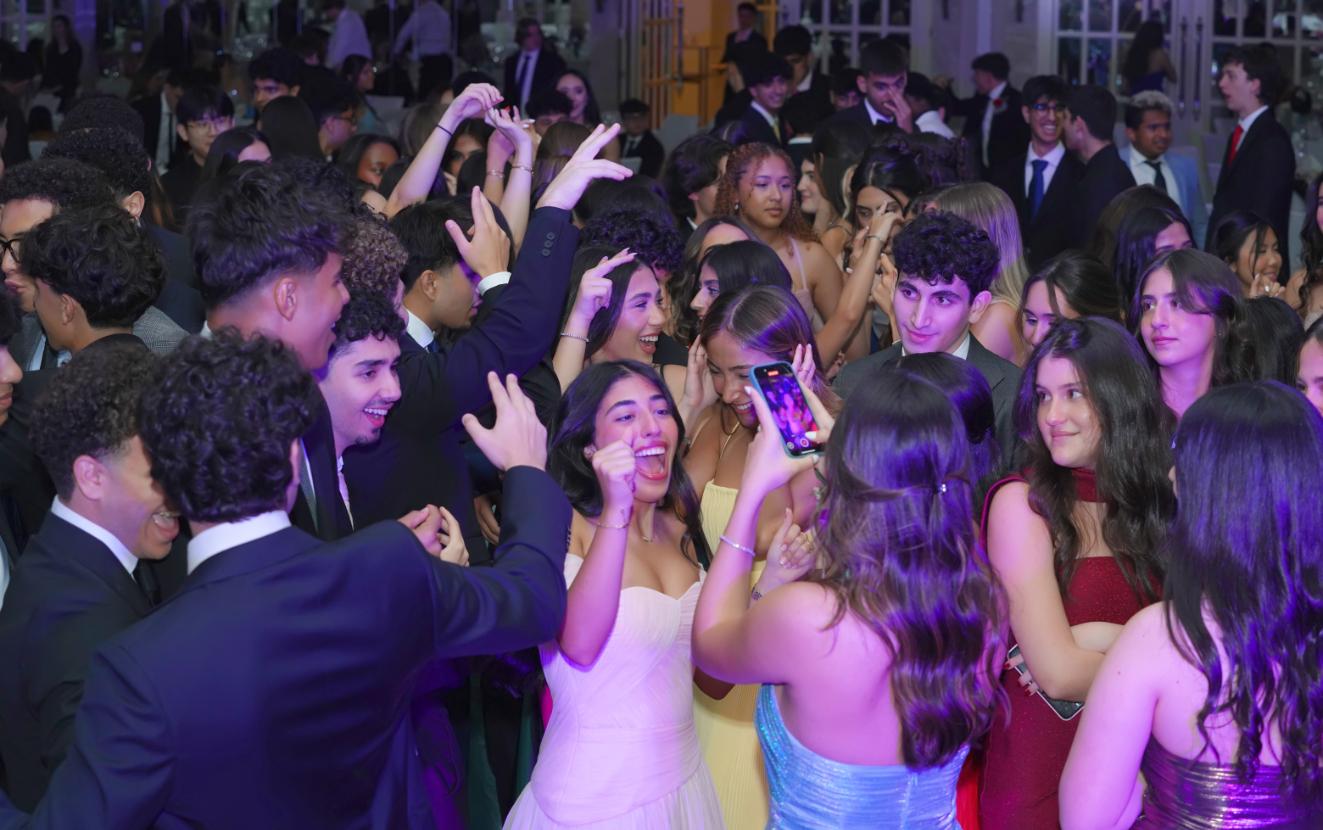
The seniors of ASD are coming to the end of their high school careers, and with that, they have gone through just about everything younger high school students are going through presently. Even though it might feel intimidating, younger high schoolers should feel encouraged to reach out to seniors when struggling with academic issues. Asking for help will only improve your school experience! ASD’s seniors will be gone soon, but before they start a new chapter in their lives, there is an opportunity for younger students to absorb the wisdom seniors have gained throughout their nearly-completed high school career.
By: Muskaan Keni
At ASD, students are no strangers to long hours, packed calendars, and high expectations. But as the competition for college admissions grows fiercer and the pressure to stand out intensifies, many students are beginning to question whether their ambition is authentic or a symptom of a broader culture of hustle.
In a recent survey of 83 high school students at ASD, 80.7% said they definitely feel unspoken pressure to go beyond schoolwork; through clubs, sports, leadership roles, and competitions. Even more telling, 78.3% admitted to joining an activity mainly because they thought it would look good for college applications.
Today, we’ll explore the growing pressure to overachieve at ASD and how it impacts students’ mental health, social lives, and sense of purpose.
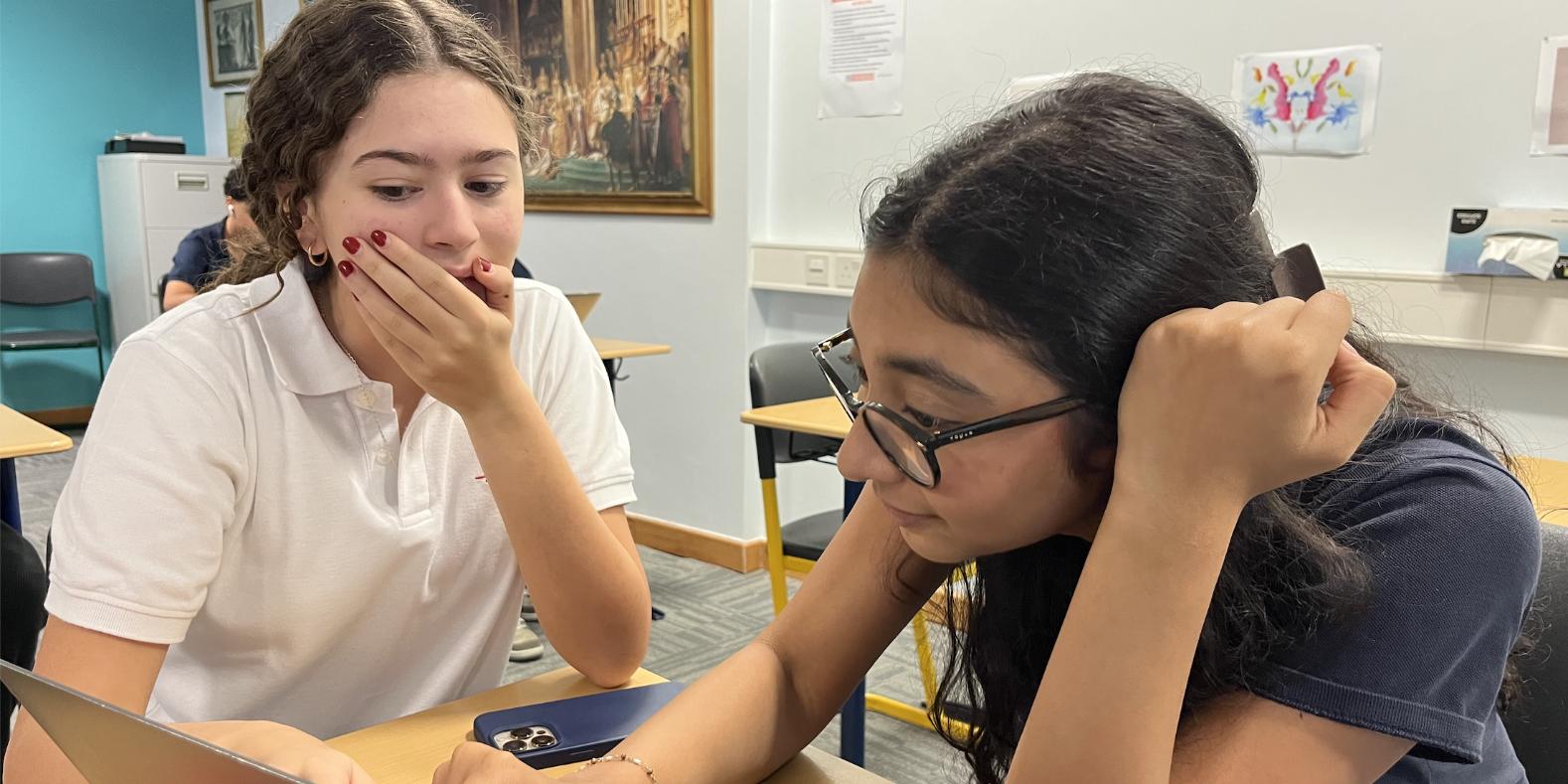
According to the survey, 49% of students rated their stress levels as a 4 out of 5, with another 16% maxing out at 5. Nearly four out of five students said they often feel overwhelmed by school and extracurriculars.
The biggest stressor? Academic pressure, cited by 89% of respondents. That’s followed by college applications (50%), extracurricular commitments (47%), and social expectations (30%).
One student reflected: “In order to succeed, there should be pressure to focus on your mental health. But instead, we’re told to succeed first, and then fix our mental health. It’s backwards.”
Another student shared, “The pressure lowers my self-esteem, which then lowers how I believe in myself overall.” Others described the environment as subtly competitive: “It makes me feel uncomfortable having to ‘compete’ with my peers, when we’re all ambitious people who shouldn’t need to push and shove.”
The toll this pressure takes is clear in students’ routines. Despite being teenagers who need 8-10 hours of sleep a night, only 12% reported getting 9+ hours. The majority clocked in at 5-6, and then 7-8, and a small portion admitted to getting 3 or fewer.
As for studying? There was a lot of variance in the results; however 46% of students study for between 4-10 hours a day. Combine that with extracurriculars, and it’s no surprise that 52% of students said they’ve felt burnt out multiple times, and another 41% said they occasionally feel burnt out but manage.
“It becomes overwhelming,” one student wrote. “Sometimes I just have to remind myself that submitting something perfect isn’t always worth the stress.”
When it comes to sacrifices? 48.2% said they often give up social events, sleep, or personal time to keep up, and 42.2% said they sometimes do.
Despite the challenges, many ASD students are finding ways to cope, and have plenty of advice for younger peers:
• “Never do something just for college. That means the college isn’t right for you.”
• “Don’t stress too much about the little things! It’s not the end of the world if you get a B.”
• “If you're not enjoying the experience at all, even a little bit, you're doing it wrong.”
• “Make a schedule, stay organized, and find time to breathe.”
• “The more work you do beforehand, the more you'll thank yourself later.”
How stressed is ASD?
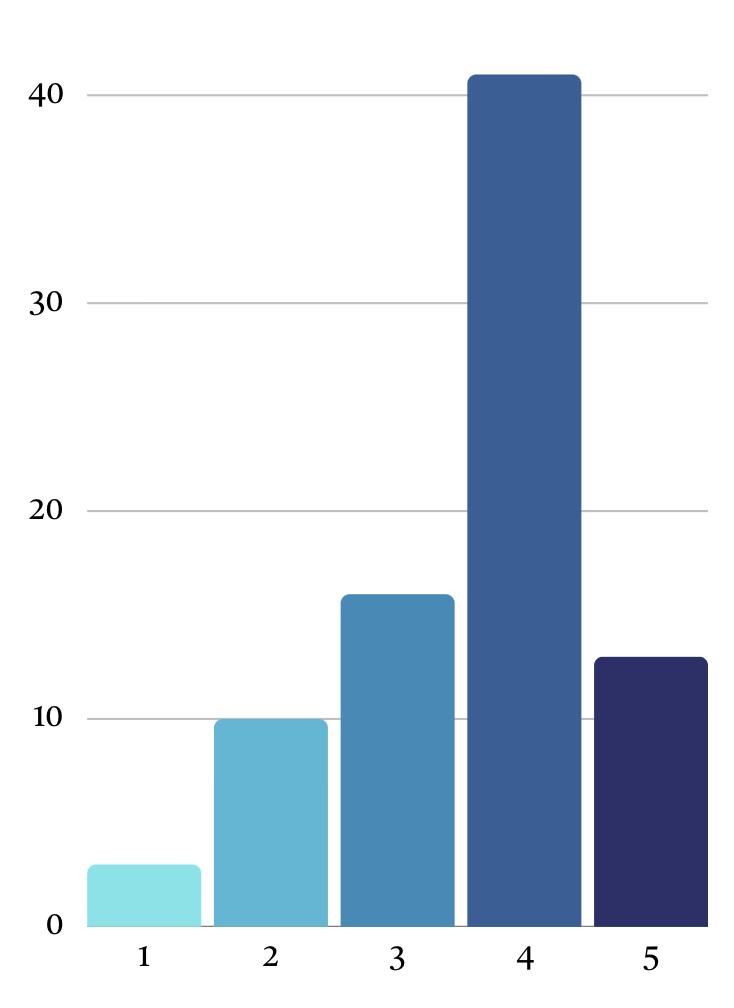
level of stress no. of people
The culture of overachievement at ASD is complex. While some students are internally motivated, others feel pushed by family, teachers, or peers. “There’s a divide that makes it hard to be yourself,” one student noted. “People expect you to conform to whatever your group values, whether that’s grades, sports, or leadership.” Another added, “We forget that going to a high-level school is already an achievement. The amazing accomplishments people make get downplayed and seen as normal.” The takeaway? Hustle culture isn’t just about ambition, it’s about balance. Passion should be the driver, not pressure. Success shouldn’t come at the cost of mental health or well-being. Maybe it’s time we collectively shift the conversation. Not just about how to stand out, but how to show up for ourselves.
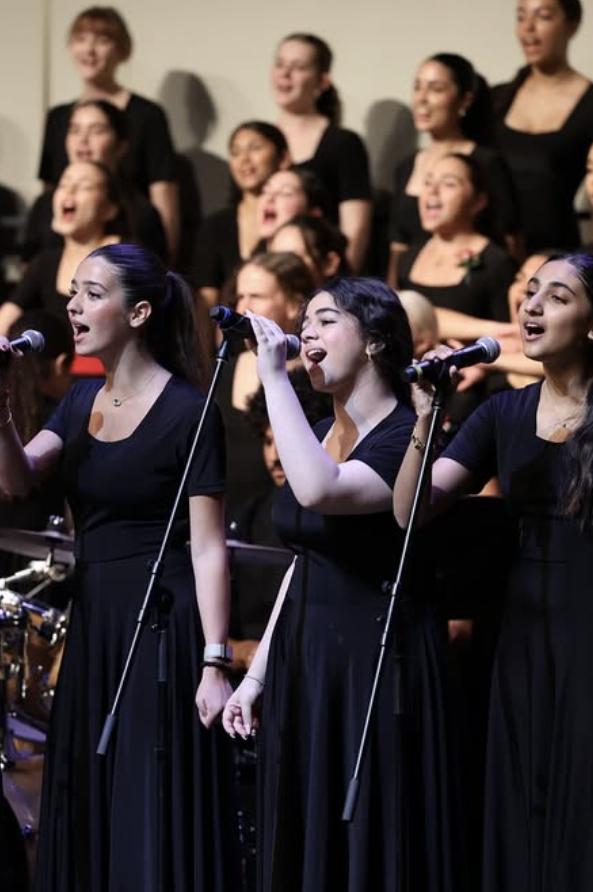
"Art
is not what you see, but what you make others see.”
— Edgar Degas
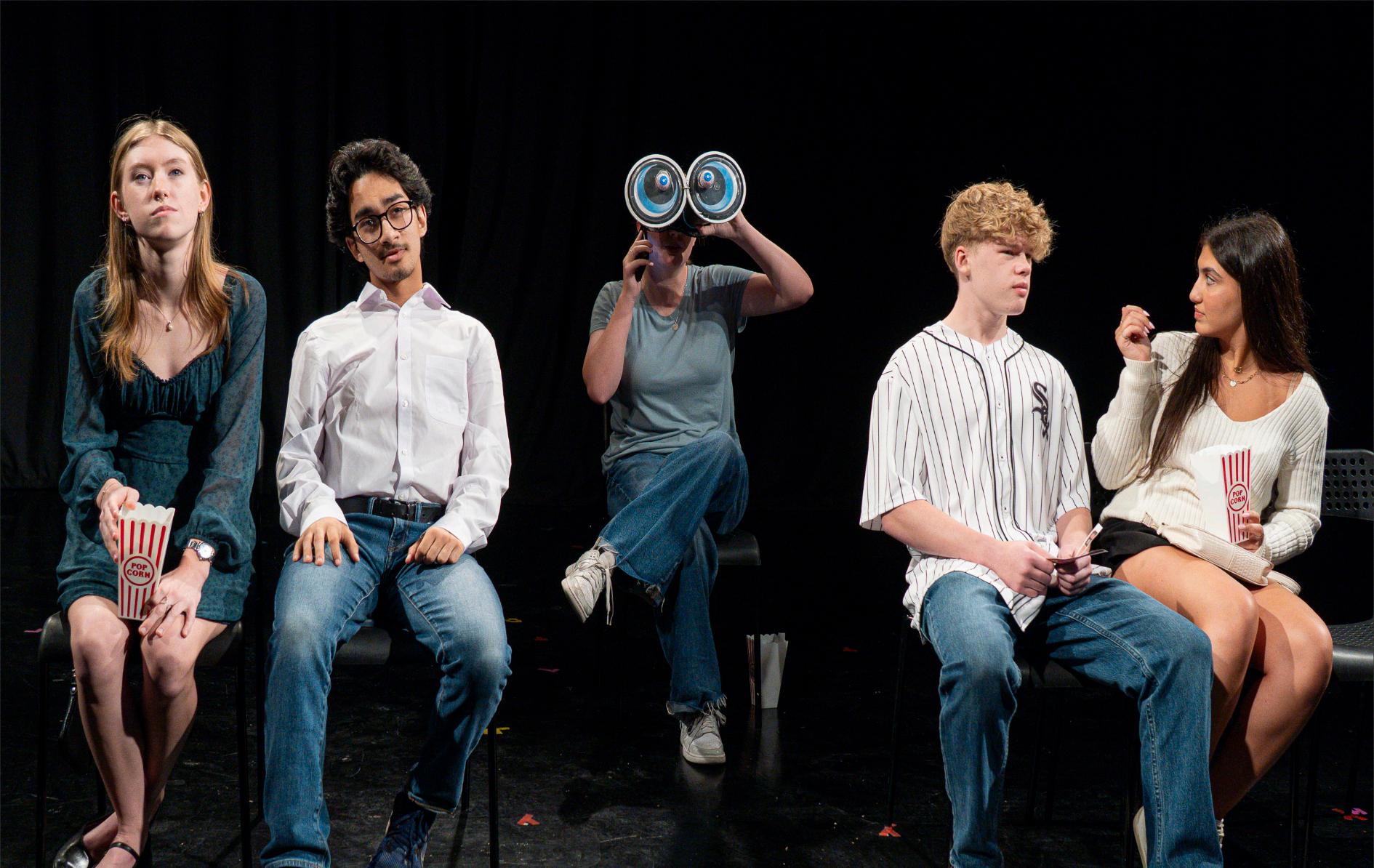
By Aahna Lal and Karma
Short+Sweet is a global festival that celebrates all kinds of performance art, including theatre, dance, cabaret, and song. It frst originated as a small festival in Australia and has now grown into a global festival with festivals residing in UAE, Philippines, USA, England, South India, Ireland, and more. The idea is simple: to showcase short performances that tell powerful stories, entertain audiences, and give unseen artists a chance to shine. With its emphasis on accessible, bite-sized performances, Short+Sweet brings people from all backgrounds and ages into the world of theatre, proving that storytelling doesn't have to be long to make a lasting impact.
ASD has been part of the Short+Sweet festival since it began in the UAE. Former theatre teacher Mr. Ridley was involved in the creation of the festival as he was so well known in the theatre community. “The founders of the Junction Theatre reached out to Mr. Ridley because he was a fantastic theater person in this community, and he helped guide them into developing a space, getting things going," says Ms. Dertian. This relationship created between ASD and Short+Sweet allowed ASD to continuously participate in the festival with their very own ten minute plays. Along with Mr. Ridley, our very own theatre technicians Rajesh and Ibrahim, helped set up the lights and sound in the theatre and trained technicians specially for the Junction.
The Short+Sweet festival allowed the growth of the theatre community in Dubai and was created because there weren't many theatre opportunities available. Over the 13 years, this festival has created a great community, going on for eight weeks every year with “seats sold out every night” according to Ms. Dertian, who has participated since she came to ASD.
“Seats
sold out every night”
- Ms. Dertian
There's even a fun audience factor including an audience vote on the best play. These plays then come together towards the end of the festival and compete for a winner. However, this is not a big concern for ASD as Ms. Dertian states, “We're trying to go there and share to a greater audience what we do really well in the school."
This year, the American School of Dubai took part in the Short+Sweet festival hosted at the Junction theatre in Al Serkal with two plays: "The Audience" and "Cubs Win." Both shows were entirely student-led with talented young actors who put their passion and skills into every scene, and Short+Sweet allowed these students to experience theater outside of a school environment. “I was really excited to fnd out I was doing Short+Sweet because it is a really fun opportunity where I can work and meet so many new people and develop my skills even more,” says Anandita Nevrekar, an actor who participated in the festival for the second year in a row. She talks about how “it was a really fun experience because I got to see so many actors of all ages performing and doing plays they were passionate about, and I got to represent ASD with a really fun play that I hope made people laugh.” These students got a chance to perform alongside other schools, community theatre groups, and independent artists, to showcase their creativity to a wider audience.
Short+Sweet highlights the power of storytelling, proving that sometimes the shortest performances can leave the biggest impact.
The actors from the chosen ten minute plays had different ways of preparing for the performance. With the overwhelming pressure of mocks being right before the show, many are unable to do much. Anandita Nevrekar, having been to Short+Sweet before, says that she prepared by “going over my lines regularly and talking to my group whenever I can about things we hope to improve on with our performance.” While Zara Bharagava decided to rehearse her own lines by herself and wait for the tech rehearsal to see how the group does.
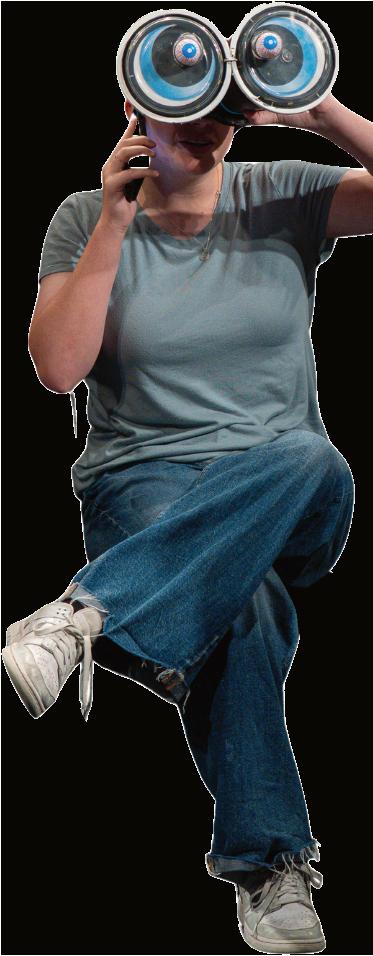
Source: Short+Sweet Photographer
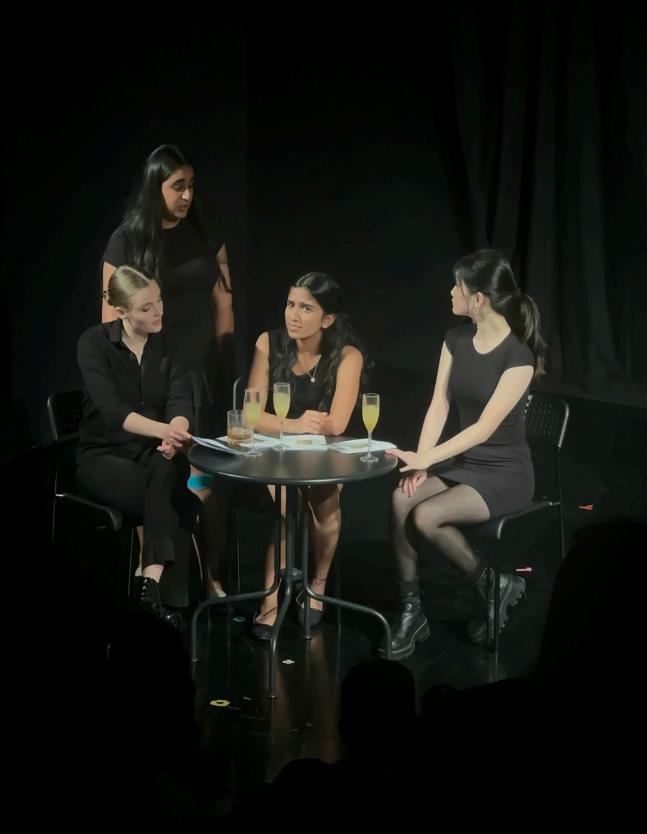
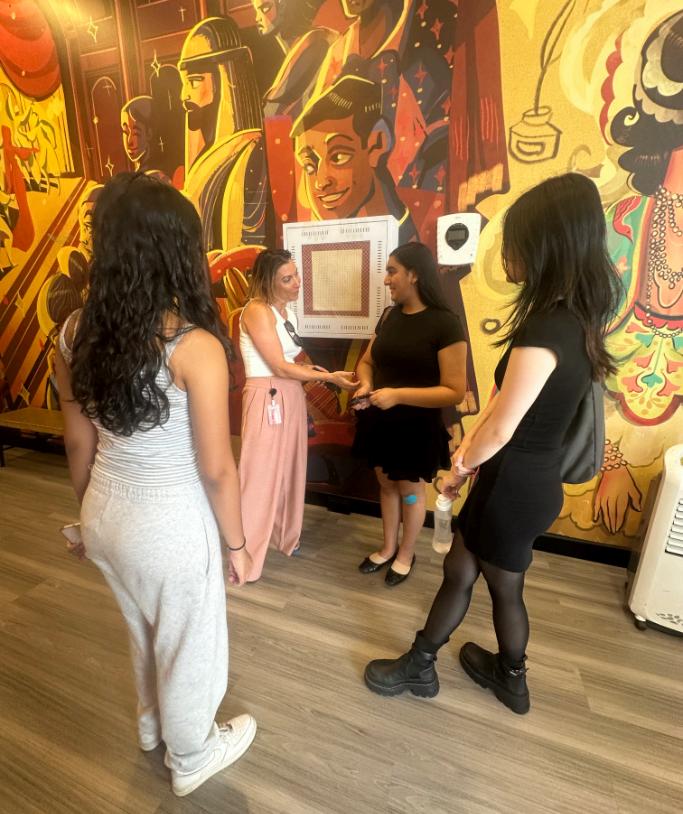
The tech rehearsal itself went super well with each play having forty minutes dedicated to them. With Ms. Dertian working hard, the performers kept repeating scenes constantly to ensure perfection in their lines, facial expressions, and movements. Discussing with the technician, Ms. Dertian made sure to have all the lighting cues and sound checks discussed to allow the performance to go smoothly, and even during the performance sat next to the technician to oversee the lighting and sounding system. The performers worked hard as well; even with challenges such as a person missing from the rehearsal or someone being unable to perform, they persevered through by substituting someone else into the place of whoever wasn’t able to make it, making sure they are able to perform no matter what happens. Even after the rehearsal, Ms. Dertian had notes given to each performer to practice on in their own time, and helped make them comfortable by giving them scenarios like people laughing and telling them how exactly everything will go during the performance with the judges, bows, and the voting system.
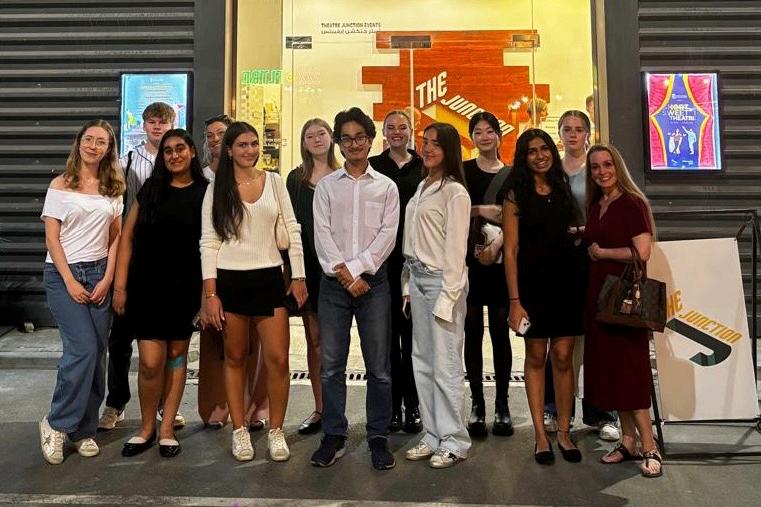
At the performance, the crowd was amazing, full of all ages and people who came together just to watch the show. They were laughing at all the jokes, clapping at the right moments, and overall enjoying the whole show. ASD’s frst performance started with “The Audience” which was amazing! The whole theatre was laughing, and people were talking to each other about how great the play was and even discussed how this could possibly be a play they would vote for. “Cubs Win” came next with everyone laughing at the jokes and staying engaged with the whole performance. The other plays were fantastic as well with Tiantian Zhou, performer in “Cubs Win”, stating that “the people here are really cool.” The shows were great ranging from humorous to sad to serious, and overall the frst weekend of Short+Sweet was a huge success.
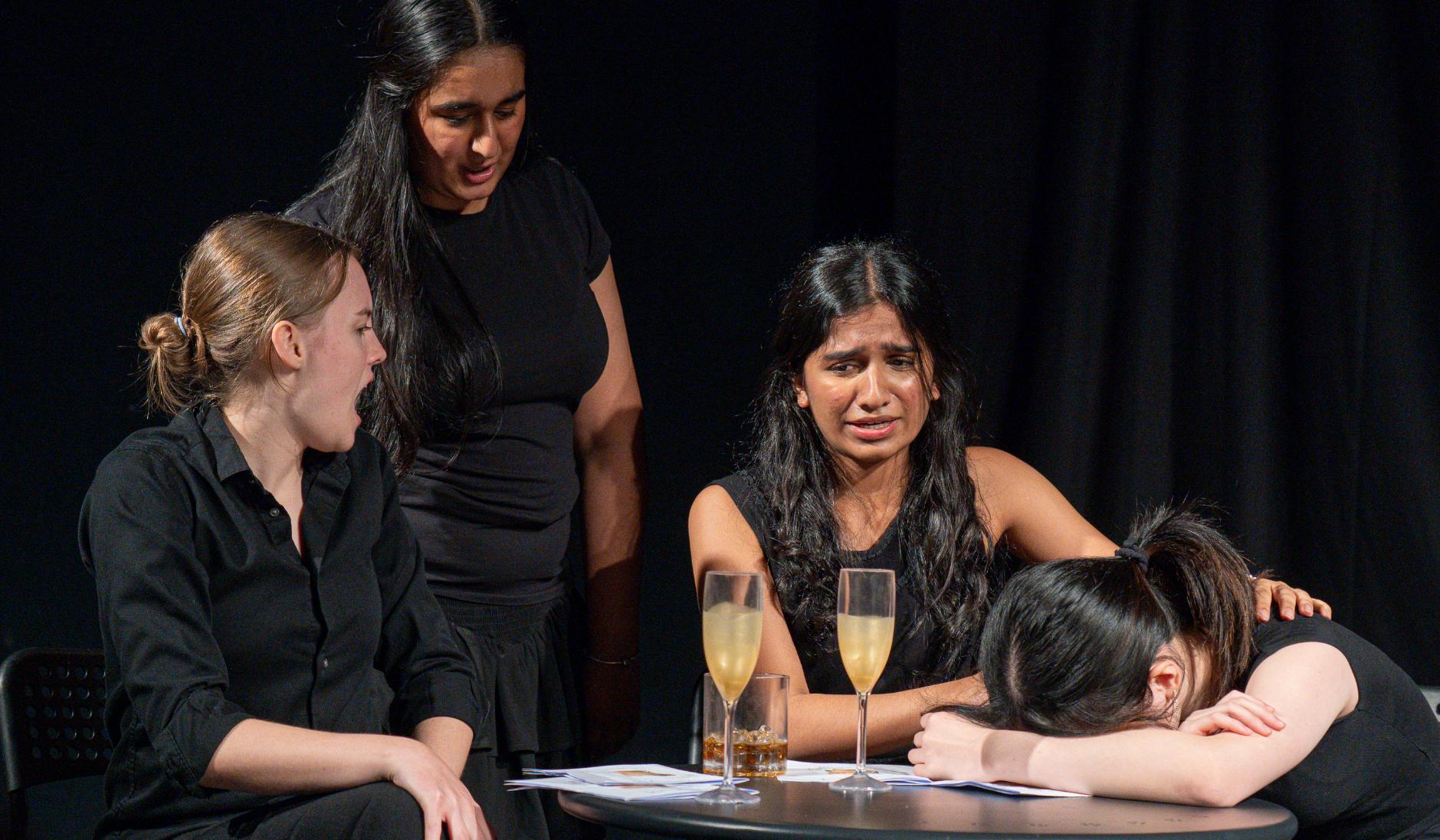
While the excitement and strong performances made the weekend memorable, it is important to remember that ASD doesn’t participate in the festival to win anything Short+Sweet is a festival that allows audience members to vote for their favorite play, and the play with the most votes advances to the semi fnals. There is also the judges vote where the second place winner advances to the semifnals, while the winner advances straight to the fnals! Unfortunately, “Cubs Win” did not manage to place in the audience vote or the judges vote. As a result, they won’t be advancing to the semifnals this time around, which is undoubtedly disappointing for the group and their supporters. Nevertheless, “The Audience” delivered a strong performance that resonated well with viewers, earning them second place in the audience vote. This impressive result secured their spot in the upcoming semifnals!
“We aren't [here] to win, but to feel like we did a great job representing the school and having fun.”
- Ms. Dertian
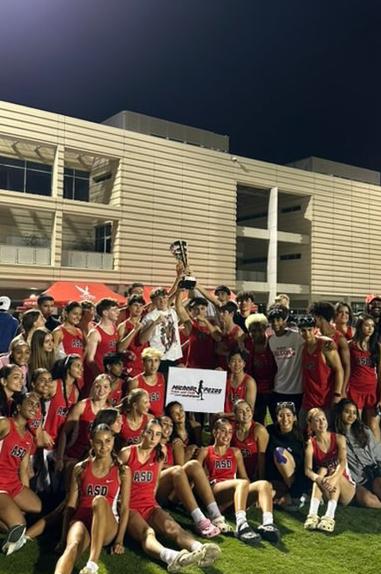
“It’s not whether you get knocked down, it’s whether you get up.”
— Vince Lombardi
By: Arta Satari and Peter Parbhoo
As season three athletics are well underway, we turn our focus to a sport which is often considered a ‘garden sport.’ Badminton, considered a recreational sport, the ASD JV and Varsity teams took on the challenge of going for gold at MESAC hosted in Muscat, Oman in the middle of April, under the guidance of JV Coaches Mr. Deepesh and Mr. Sawyer and Varsity’s Coach Abhishek and Coach Paul. We caught up with coaches and players around their thoughts on badminton’s misconceptions and beliefs and how coaches mitigate these assumptions to improve their respective teams.
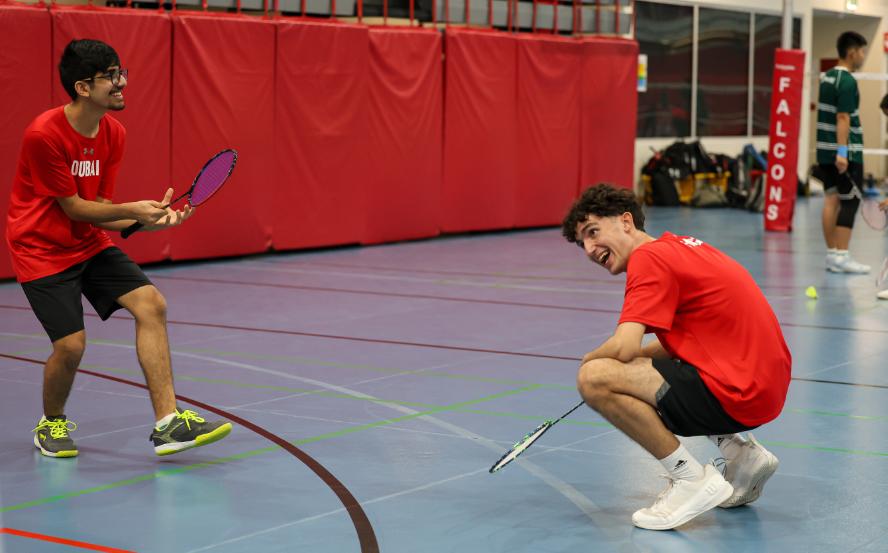
The current varsity teams consist of players of many different backgrounds and badminton histories, stretching from frst-season shuttlers to veteran varsity players. This combination has created a unique environment amongst players and coaches. Unfortunately, many see the sport as less competitive than other sports in the school, and so many students, including current varsity players, deem the sport as less important and less valuable than others. We spoke to a frst-time team member, Yunje Oh. Our topic of discussion was to do with misconceptions of badminton and how the sport is perceived by others. His answer was as followed, “Many people think that badminton is a very easy sport to play, but what they don’t understand is how much strategy and technique goes into playing
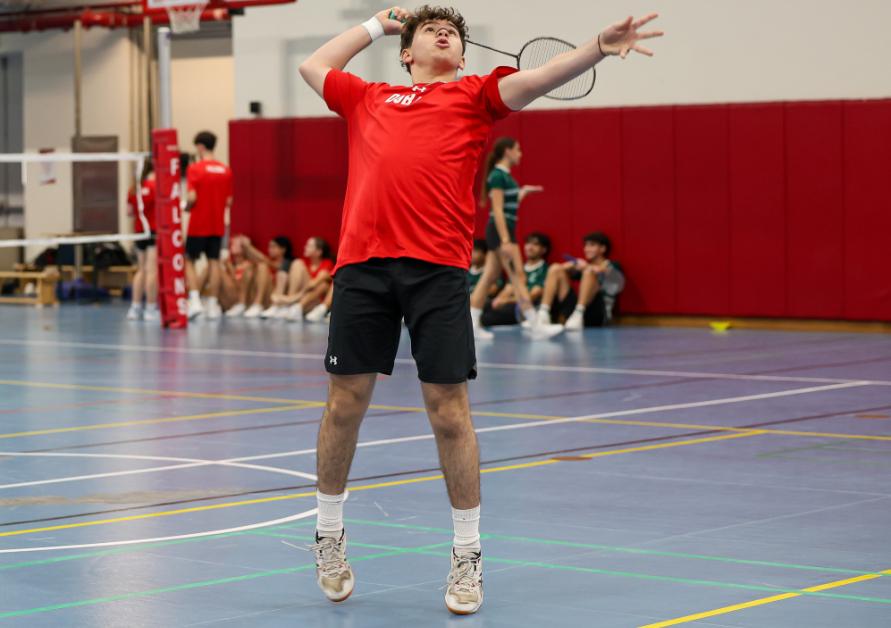
badminton, and to improve in badminton, and to me that is a misconception that people think about badminton, which should be changed.” The combination of quick refexes, tactical awareness, mental strength and precise footwork all combine to make the sport as intense as it gets. Each game means new opponents, new strengths and weaknesses, and the need to adapt to your opponents' habits and tactics, just for three sets.
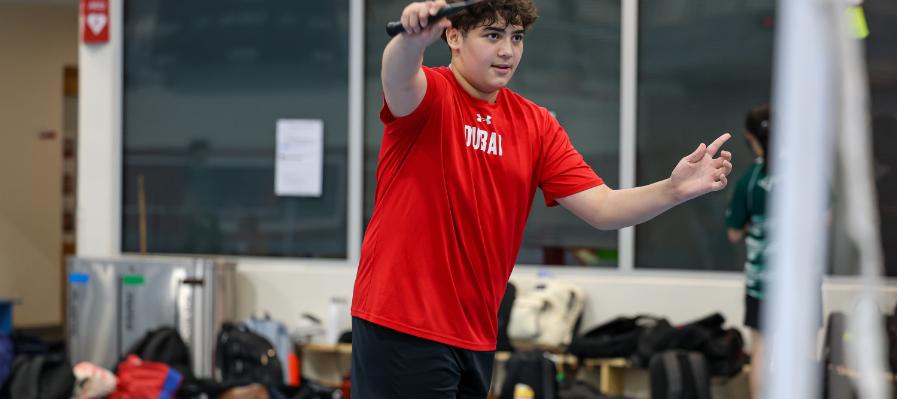
It’s important see multiple perspectives and reaching out to a senior member of the varsity team, grade 12, Zaid Taqi was very passionate about speaking to the misconceptions he believes are present throughout the school, “A common misconception about badminton is that it is an easy sport, not requiring much energy or effort,” he started off with. “Since there are practically no breaks in between points, play becomes intensive, especially in singles matches. Tiring out mentally or physically gives the opponent a massive
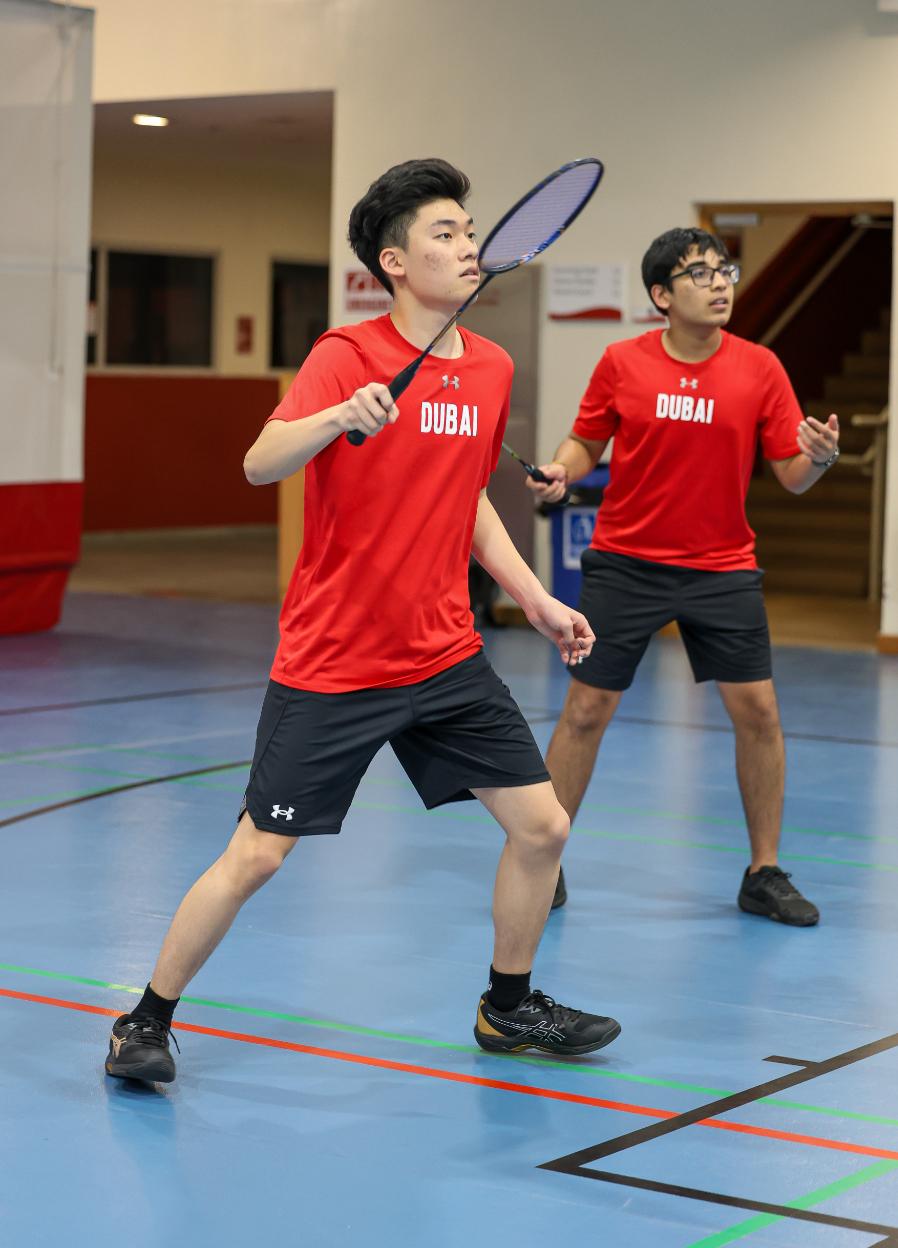
advantage; therefore, it is crucial to conserve energy to become a successful player.” His strategic thinking speaks clearly to the intensity which is needed to be successful in the sport at the competitive level, a varsity team requires not only to compete, but to succeed.
The Junior Varsity badminton team is working hard, with four practices a week, these athletes are putting in time and effort to prove that badminton is way more than just a casual sport. “One misconception people have about badminton could be that it is an easy, calming, and simple sport,” said JV player Leah Choe. “There are many components that make badminton a fastpaced and physically demanding sport.”
For JV players, under the leadership of Coach Deepesh and Coach Sawyer, practices go beyond just playing matches, with an emphasis on footwork, teamwork, and advanced strategies, beyond what is learnt in casual play. As Leah put it, “We don’t only focus on playing but on training skills and techniques,” something that clearly separates JV from recreational badminton.
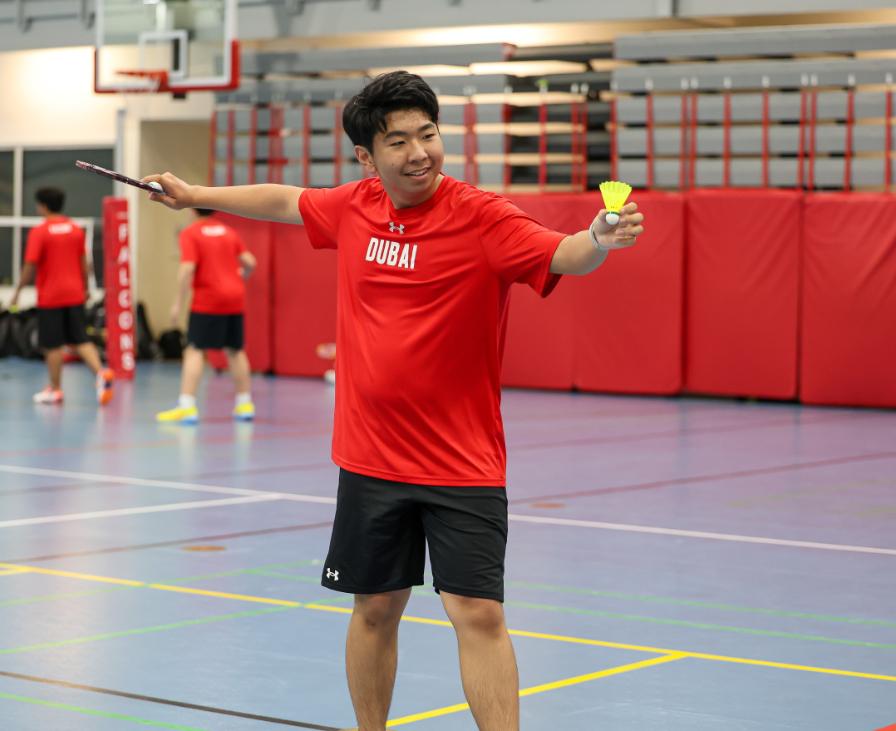
JV Coach Mr Shawn Sawyer has seen frsthand how the backyard stereotype is. “Badminton is kind of viewed as a backyard, barbecue, family kind of game,” he said. “But you have to build a culture of seriousness and practice through hard work, through focus, through listening.” Because there aren’t many badminton clubs or competitive training opportunities outside of school, many students come in with only casual experience. “We have to teach these really highly competitive skills, which are not done very commonly outside of schools,” Mr. Sawyer explained. JV player Ryan (Yu) Yuan agreed, pointing out how the intensity of competitive play often surprises people. “Everyone thinks it’s like a really easy sport to play,” he said. “But when you play at a competitive level, it’s really hard, especially receiving
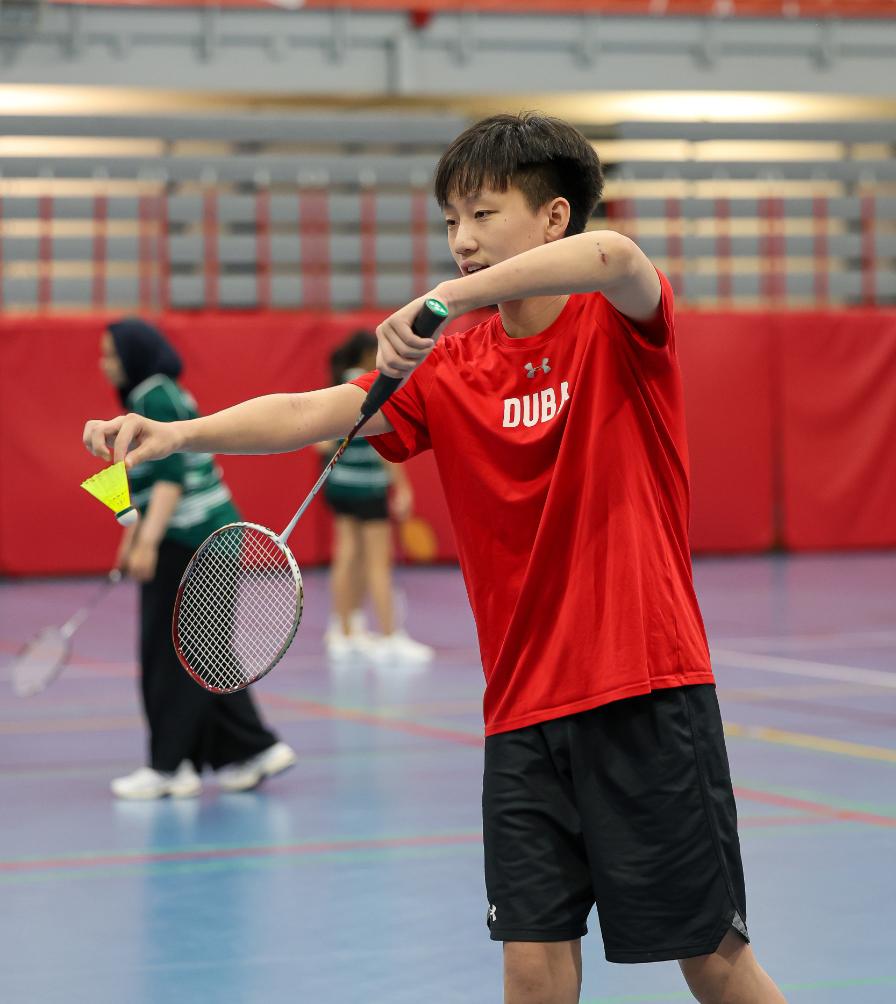

By: Kamila Shah

When we hear about season 3 MESAC, our mind often goes to the athletics side of activities such as softball, track and feld, badminton, and baseball. While all of those are very time consuming and rewarding pursuits, we often forget to acknowledge our brain based athletes on the “Speech and Debate team”. In this article, We will get a deep dive into the hard work, emotions, and hopes from ASD’s speech and debate team. Many of us have thought about joining the team but are unsure of the standards and work load. After an interview with a couple of team members and one of our coaches, all of those curiosities and uncertainties were resolved.
A little history for all to know is that forensics speech and debate has been around for decades at ASD with many memorable thespian and debater alumni having participated in MESAC. This year, MESAC for speech and debate is taking place in DAA where all 6 Middle Eastern and South Asian schools come together for some friendly competition. The amazing thing about this event is that, despite the somewhat deceiving title, this competition is not only for debaters and public speakers, but also for actors who have the choice of acting comically or seriously by themselves or with a duet partner. This allows not only all sorts of people to showcase their different talents, but to also make friends with students who have different and similar interests as them.
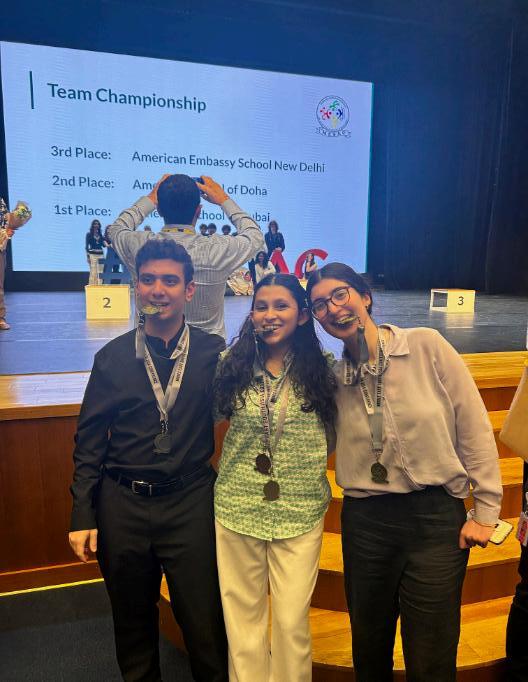
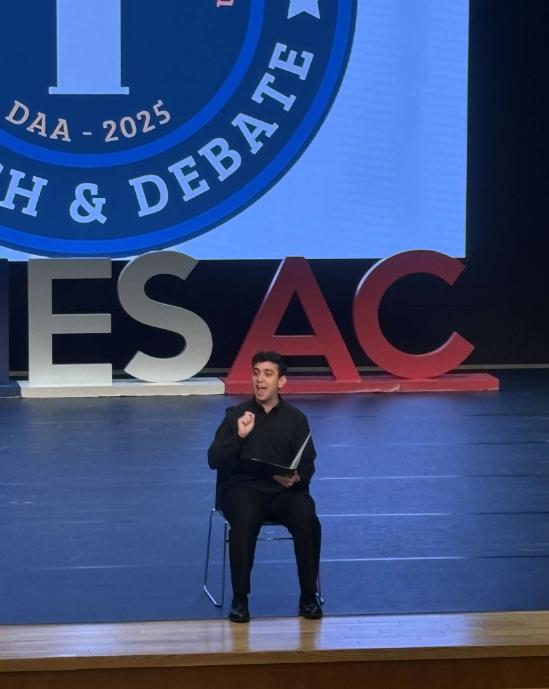
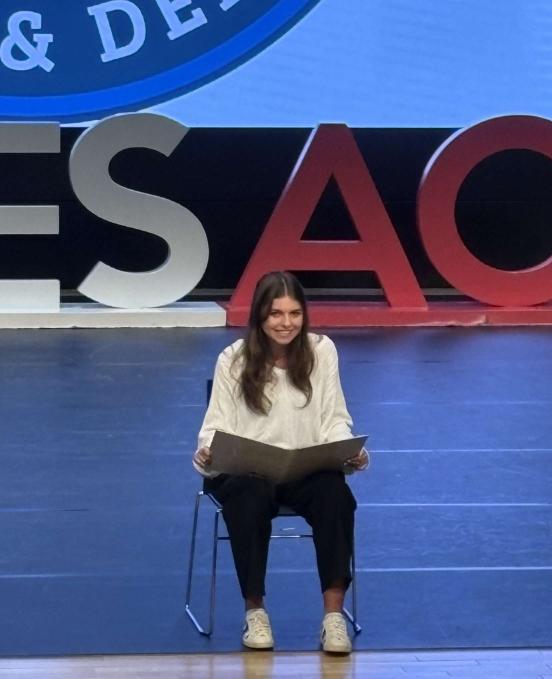
The common 2 questions one may have about the team is A) How fun is it? And B) How is the workload? After a conversation with a new member on the team, Chloe has given her insight on this inquiry. “(Quote will be received on Tuesday)”. If you are thinking of joining the team for a longer period, one of the team leaders Daniel who is a second year team member stated how he felt at the start of his forensics journey to now. “(Quote will be received on Tuesday)”. Of course, the backbone himself must give an insight on how his students feel on their frst vs their later years on the team. Mr. LaRaia has been the speech and debate coach since 2017 and has made observations about his students.
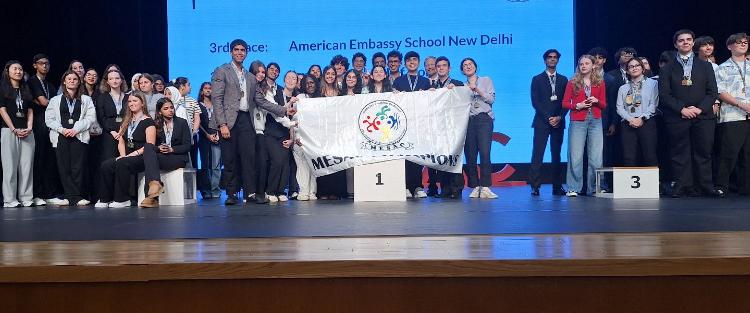
He claims “Students come to the S&D team excited and nervous, because we have such a reputation of winning and success. Students are excited to be a part of our very special team, but, I know, often worry--too much-about winning when it comes to the MESAC competition. I want them to come to us knowing, frst and foremost, that team--being on the team, supporting one another, winning not alone but all together--is what is most important. Being on Speech and Debate is a special honor, not because we are talented or that we have an amazing winning record or that we have a great time, but because we are a team, and that our ethos of supporting one another to win together is what is most important. So, to answer your question--students come to us excited and nervous, but leave knowing how important they were to our whole team and hopefully proud to have been a part of something very special”.
In conclusion, joining the speech and debate team is an unforgettable and uplifting experience. You work with people who are not only interested in the same passions as you, but you also get to view other’s talents along with watching yourself and others thrive and beneft through each practice session. Whether you travel or stay home, you will never regret being a part of the forensics speech and debate team.
By Maya Khoury
For years, MESAC softball has meant home-feld advantage, familiar turf, familiar crowds, and the comfort of playing in Dubai. But this season brings an exciting change. For the frst time since the COVID lockdown four years ago, ASD’s Varsity Softball team will pack up their gear and take their game abroad.
This year, both the MESAC Varsity Softball and Baseball tournaments will be held in Doha at an all too familiar rival school, the American School of Doha, on the 16th of April. Every MESAC for as long as most players can remember, has been held at the Dubai Little
League felds due to an agreement with DLL as they are the only team, although not a school, that has enough felds for the competition to go on effciently, meaning that both Softball and Baseball teams have never gotten the chance to travel abroad and have only been able to experience the competition locally. As most ASD students know, MESAC weekend creates an air of excitement like no other, especially when traveling. Personally, nothing compares to the thrill of having six schools all in one place to compete for gold and your peers in the stands cheering you on.
However, in a rare lineup of events,
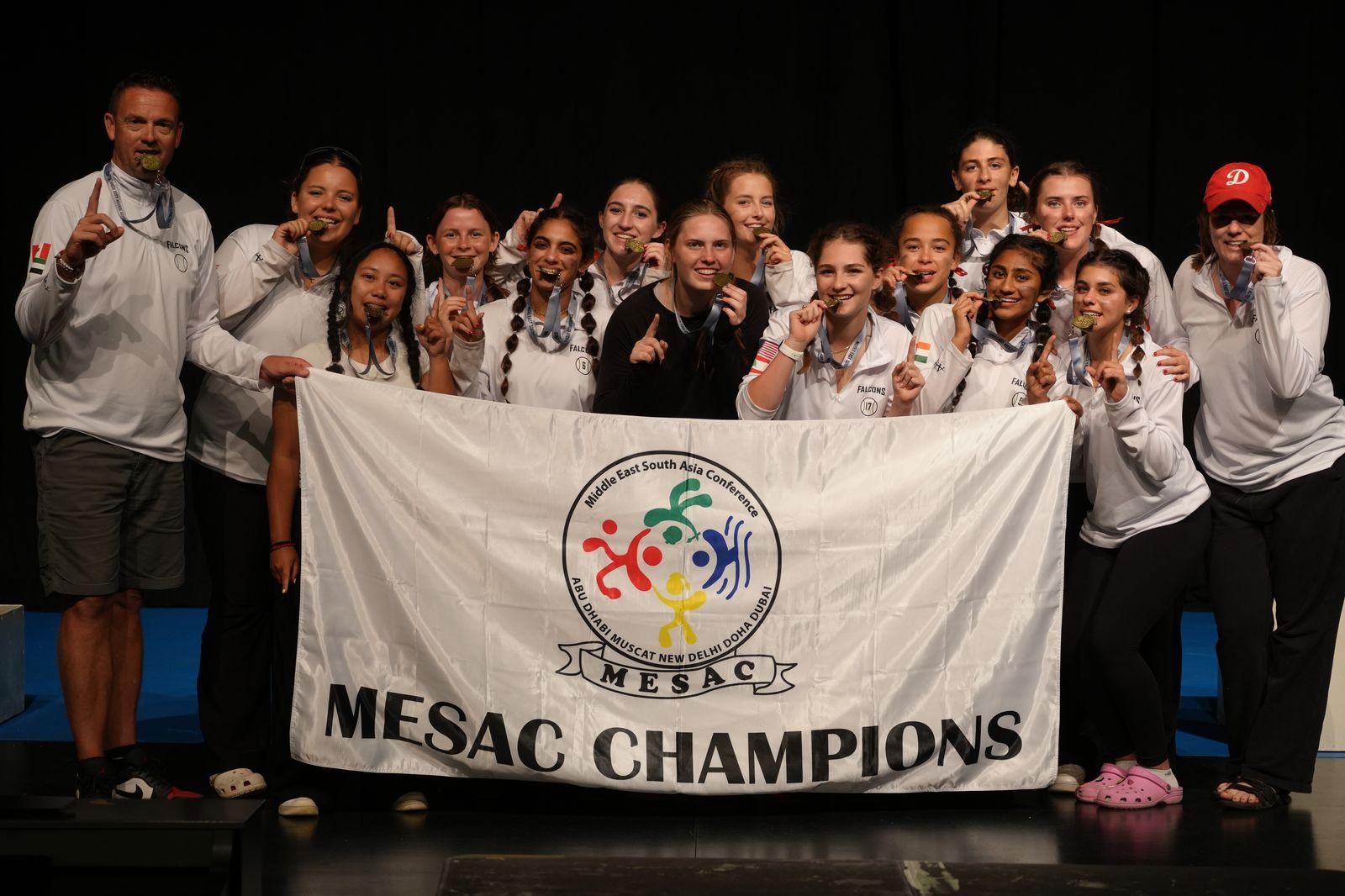
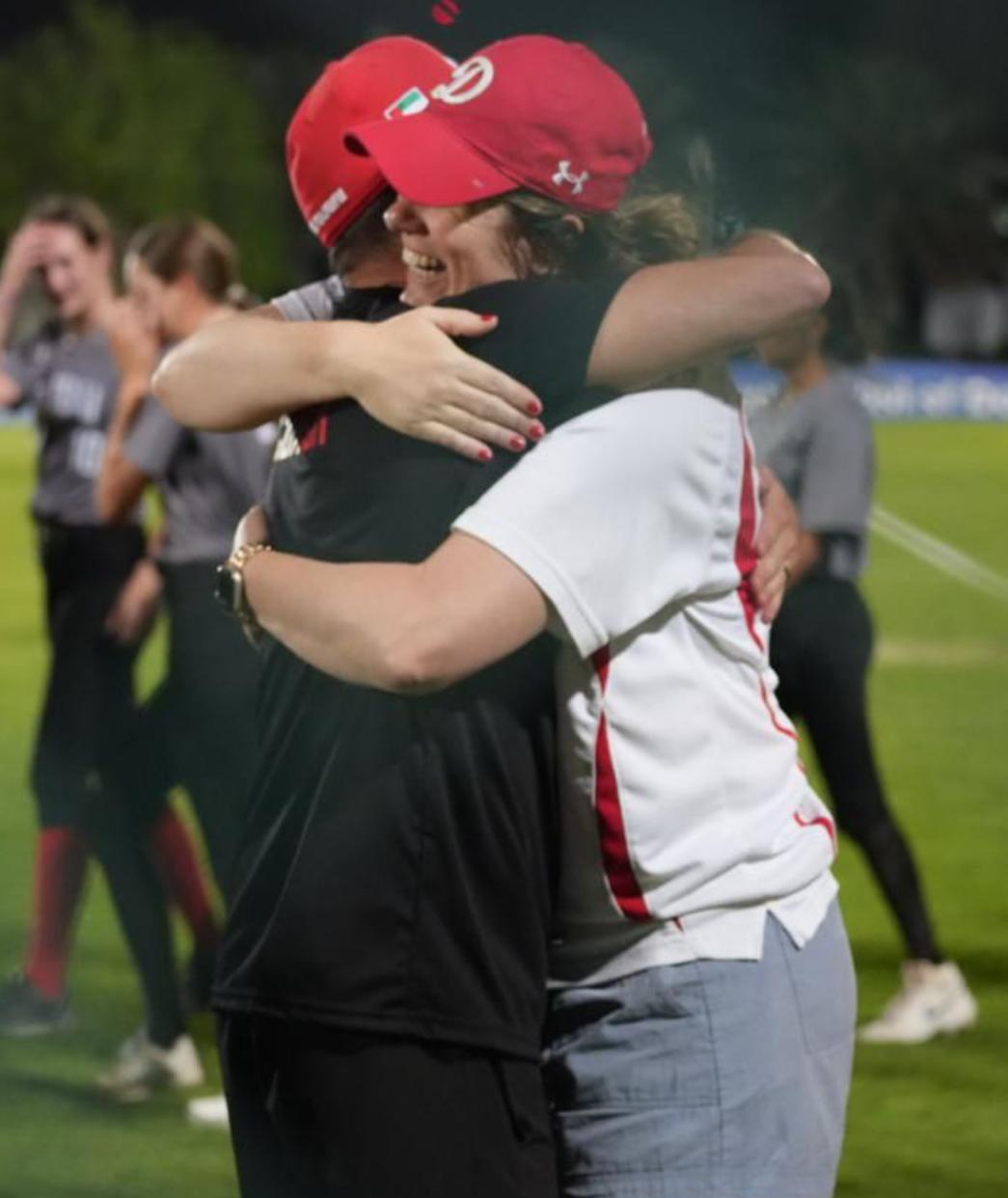
no MESAC competitions will be held at ASD this season. Considering that ASD has even hosted MESAC tournaments by proxy in the past due to COVID restrictions, the absence of the MESAC spirit from our school’s gyms and felds brings a strange feeling to the fnal sports season of the academic year. However we must remember that just because there are no games to watch here, ASD is always here to support our athletes: whether it be online on the MESAC live streams, by keeping up with the scoring through the website, \ or by keeping up with those
you might know on a season three team. For many of our athletes, this will be their frst time experiencing MESAC outside of the country, making this year’s competition even more special. While traveling presents new challenges, it also offers an exciting opportunity to bond as a team, adapt to different playing conditions, and represent our school on a bigger stage.
With months of dedication, teamwork, and training behind them, our three-time gold medalist Varsity Softball team, currently on a winning streak, along with the Varsity Baseball team, are ready to make an impact at MESAC and aim for another championship victory. As the tournament approaches, students, faculty, and families are encouraged to support our teams in any way they can. Every bit of encouragement makes a difference. So stay tuned and get ready to show your school spirit!
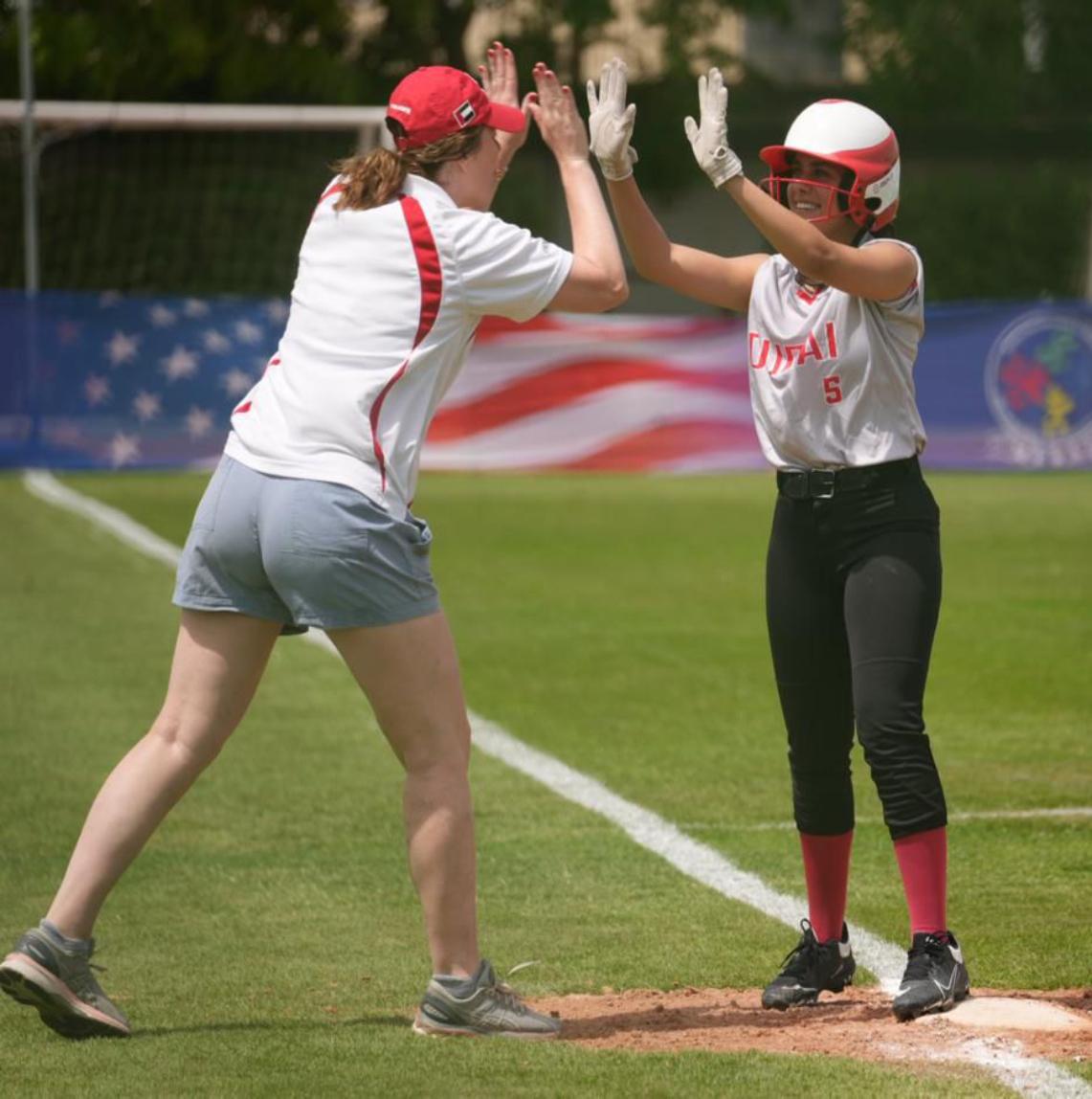
By: Mahad Rahman
Most sports people watch are relatively one-dimensional in that they focus on just one thing (like how football is about getting a ball in the goal). However, track and feld is different; athletes train in 3 disciplines: running, jumping, and throwing. It is also in MESAC Season 3, hosted at ACS Abu Dhabi from April 17th to April 20th.
Diego Webb, an athlete participating in Track and Field, spoke about his preparation for the season. Before the start of the season, he likes to “run a little bit beforehand” so that he can be mentally ready for the season ahead.
He also believes people can “run faster than they think”. Webb’s favorite part about the sport is the team getting together and cheering each other on, showing that Track and Field can be just as much of a team sport as others because of the athletes’ ability to encourage each other to do better in every single event.
The efforts for preparation by the athletes were apparent, and the results for the season refected that. Overall, ASD won frst place with 22.5 points. Specifc categories included Junior Varsity and Varsity girls (99 and 116.5 points, respectively, earning ASD frst place in both), and JV and Varsity boys (96 and 98 points, earning ASD frst and second place, respectively).
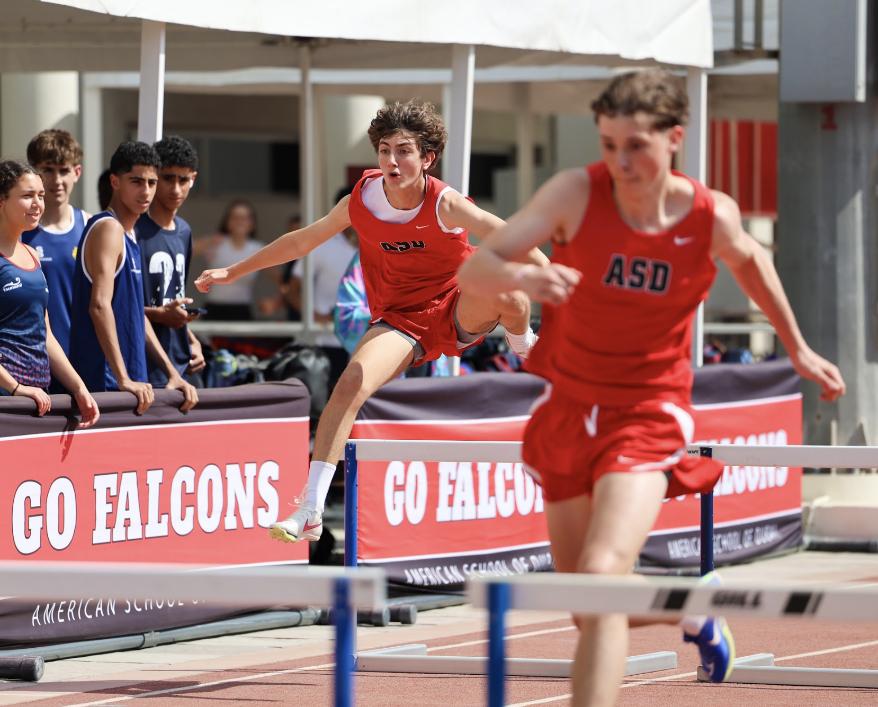
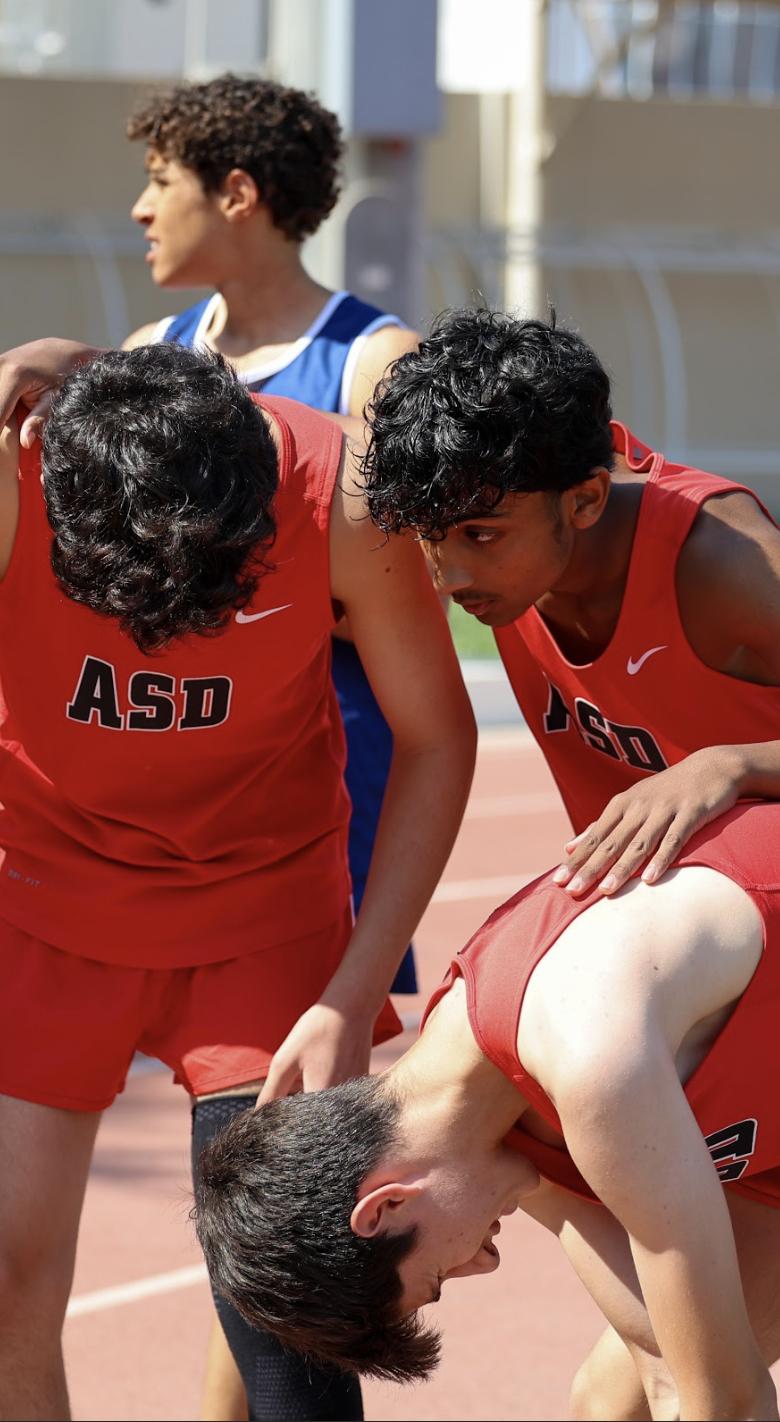
Source:
Mr. Chamberlain, the head Track and Field coach, emphasizes that track and feld is an important activity because it is a “great way to teach students how to train their bodies and adapt to various needs of speed and agility”. Additionally, the sport seems to be one of progress and adaptability. Mr. Chamberlain explains that because events are standardized, a person can “track progress against former years” and, as a result, become a better athlete. He also explains some more science behind the training process regarding actual biology. To conclude, Mr. Chamberlain says,
“[A person] ha[s] to be comfortable being uncomfortable”.
Based on the results of the season, athletes seemed to have adopted this philosophy, pushing them into growing as players and eventually, lead to success during MESAC.
Track and Field is an interesting but physically challenging sport for the athletes. When Mr. Chamberlain was asked about audience sizes, he said that he used to do the sport in stadiums with 90,000+ people when he did it in the US, much more than what he gets here. He invites students next year, although they might be busy with school work and their extracurriculars, to watch Track and Field MESAC or some invitationals to enjoy this sport.
Additionally, because of the great results from the ASD team and the passion displayed by Mr. Chamberlain, it is even better for students to come and support ASD’s successes in this sport as well.
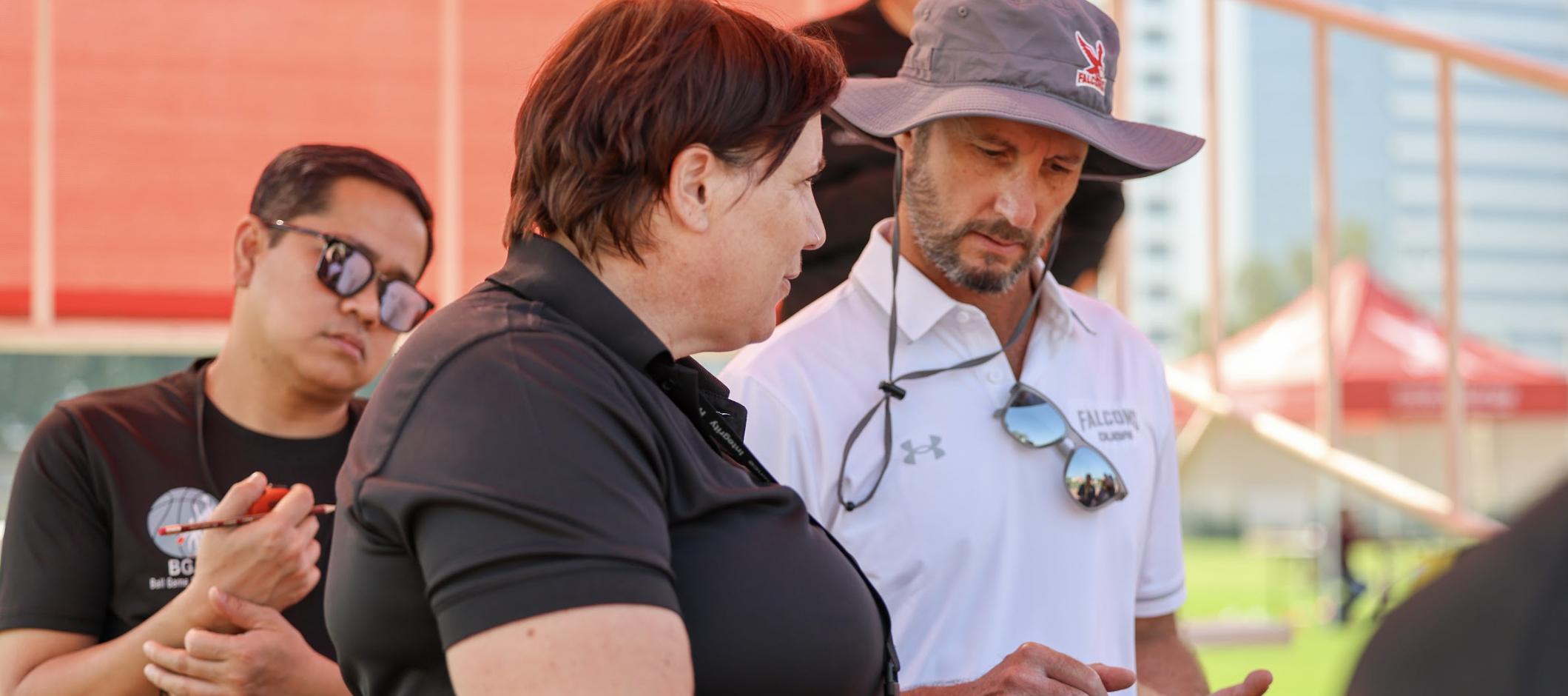

"The greatness of a community is most accurately measured by the compassionate actions of its members."
— Coretta Scott King
By Kian Daryani
Imagine going through the school day looking forward to lunch, excited to eat a delicious meal of your choice. This might sound like a dream now, but it doesn’t have to be. With the help of Mastercook and possibly other food vendors, we can create a wider variety of food for students to eat here at ASD. This would make lunch much more enjoyable and improve student morale. There aren’t many good food options here at ASD, and we could beneft from an upgrade. Although Mastercook food isn’t horrible, the sandwiches and a lot of the other meals aren’t too favorful and contain a lot of the same ingredients.



I spoke to some ASD students, and they gave their opinion on our current school food options. Lukas said, “We want more options in the cafeteria. There are barely any good desserts, and the wraps all taste the same.” This is a very valid point because although there are many wraps in
the cafeteria, they aren’t very popular, and some of them are bought little or never. Another anonymous junior at ASD stated, “I don’t even eat lunch at school, I wait to get home to eat.” This also shows how Mastercooks options are hurting students, because think about how much more energized we would be if everyone ate more throughout the day and didn’t starve themselves. Dalia, another student, said, “We need more drinks in the cafeteria.” This is another very valid point, as the drinks we currently have are very slim in favor and options.
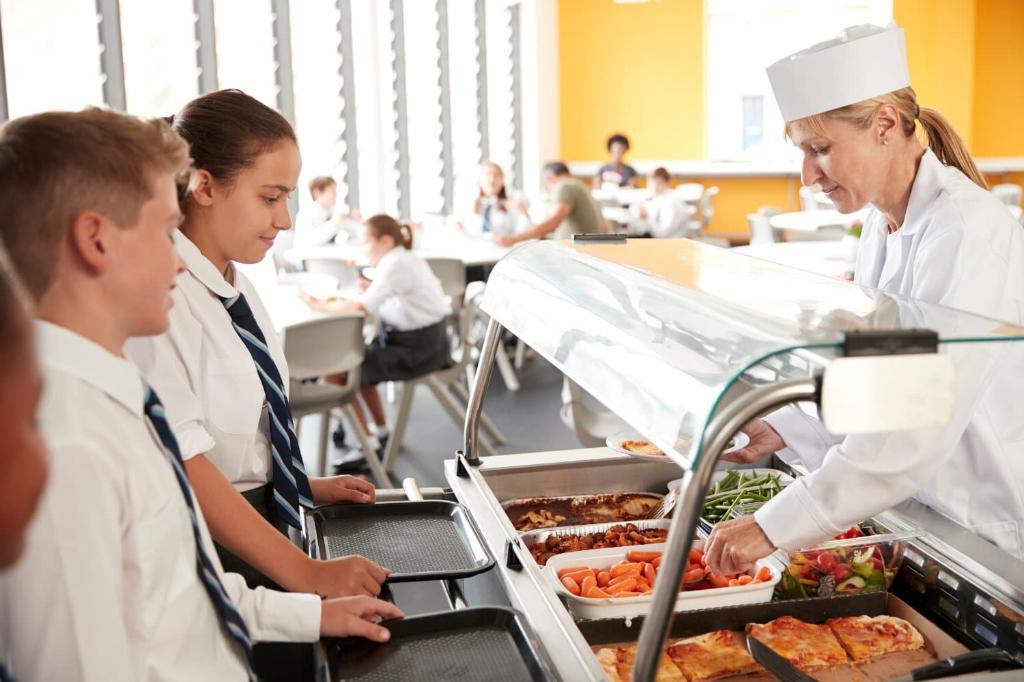

There are also a lot of studies and research that help back up the fact that better and tastier food would result in happier, more hardworking students. CDC (Center for Disease and Control Station) states that “Good nutrition is essential to keep current and future generations of Americans healthy across the lifespan”(CDC). And although the food at Mastercook isn’t very unhealthy, this defnitely is still something that backs up my call for change, as I personally know students who eat little to nothing at lunch because they aren’t satisfed with the options. Widening the menu and taking student suggestions would help improve hunger and energy levels. Student suggestions are actually something that works in other schools around the world. From Lewisville, ISD’s website, a city in Texas, they speak about how “Students from various LISD schools, from elementary to high school, were given a chance to vote for food items they may want to see on next year’s menu”(ISD). This is defnitely something that Master Cook could implement as it would provide better menus to which students have contributed. Then perhaps students would be happy to eat in the cafeteria every day.
By: Lulu Ataya
For many ASD students, the shorter school days in Ramadan seem like an ideal way to catch up with all the upcoming tests as our year approaches the end. But are these two less hours of school really making a difference or creating new challenges for students instead?
During Ramadan, students have been blessed with school days that start ten minutes later and end just under two hours earlier. Considering we are only a few weeks away from mocks, a little over a month away from APs, and much of the student body is fasting, this new schedule is leading to many changes within students' lifestyles and study habits.
One of the biggest impacts of this schedule change is students' productivity. Many students, especially those fasting, have felt a change in the amount of work they are completing. Over 64% of the student body shares that they are getting less work done, despite the schedule change meaning we have more free time after school. With many summatives racking up this month and mocks just around the corner, the pressure is growing. However, many students who are fasting are fatigued by the school day and aren’t able to complete much work until after Iftar, when they can fnally eat and drink.
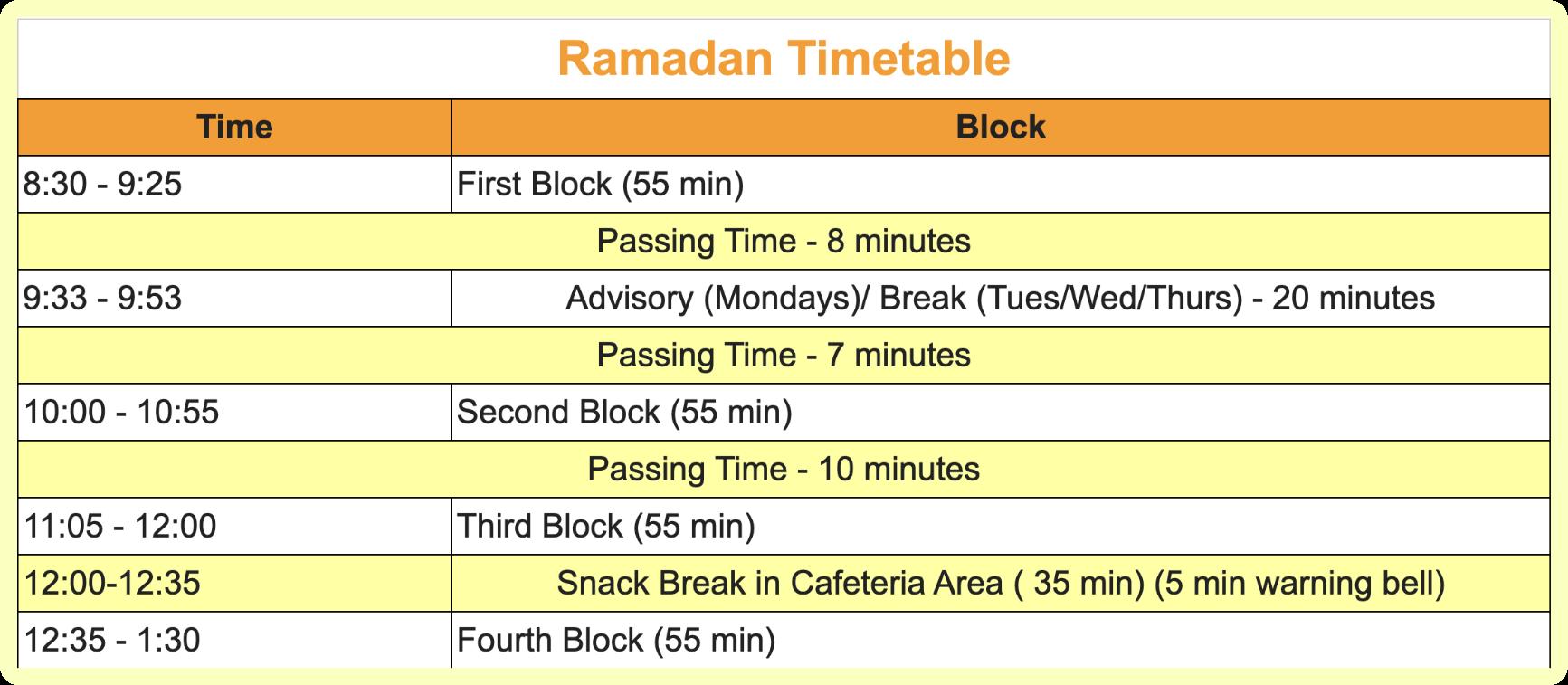
With this arises another challenge beyond work habits. Even students' sleep schedules are being impacted this month. More than 76.5% of the study body has shared that they are sleeping for reduced hours during Ramadan. While this may seem shocking as we start school 10 minutes later, multiple students have stated that this later start isn’t actually making much of a difference in how long they get to sleep. Due to other schools also starting later during Ramadan, ASD students have shared they must leave their houses at the same time, or even earlier, than they do on a school day to not be tardy as a result of the immense traffc on the roads.

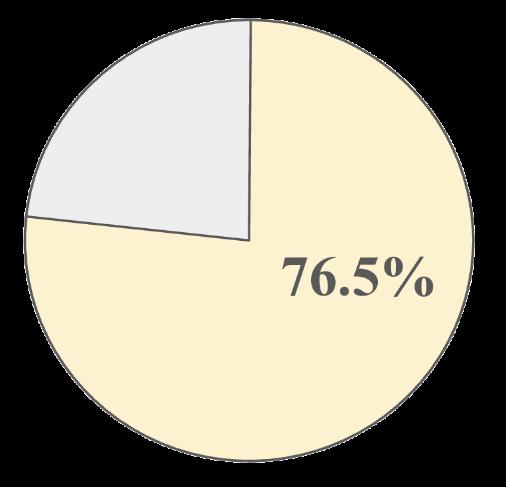
Together, these two challenges are creating a harsh loop in which many students fasting are fatigued by the school day, only start work after iftar, and end up staying really late to complete all this work. Nylah Mohamed, a junior, shares what it’s like to be caught up in this cycle: “I know that I really need to study, but I wake up at 5 am for suhoor. Then I have to wake up again at 7 am for school. So I'm always just exhausted and end up napping as soon as I get home from school. Then I end up not studying until after iftar, so basically just at night, and have to stay up really late to complete my work.”
However, not everyone is stuck in this loop. Others have created benefcial habits out of the shorter school day. Junior Miraya Adnani shares her positive experience with the Ramadan schedule: “I love the Ramadan schedule because being released at 1:30 means I can do so much more with my day and get so much more done. After school I have the time to see friends, study, and the best part is even shop during the school week”. In both cases, it's safe to say the student body is grateful and appreciative for this schedule change during the month of Ramadan. Balancing academics and Ramadan can be extremely challenging to many, but it is important for students to continue to push through and develop resilience and time management skills to ensure we are successful during such a crucial part of the school year.

By: May Mutwalli and Nayla Jarmache
Prom King and Queen traditions in the US trace back to the 20th century, infuenced by European customs and traditions of crowning royalty at their formal events. The word “prom” comes from “promenade”, referring to 19th-century European dances, which eventually made their way to the US by the 1930s. The 1950s marked the golden age of prom, transforming it from simple school gym dances to venues outside of school. Its cultural signifcance was marked in 1963 when President JFK stopped by a prom. Today, prom is a rite of passage celebrated in movies, music, and pop culture. But the real question is will this year’s prom be a magical High School Musical moment or a scene straight out of Carrie?
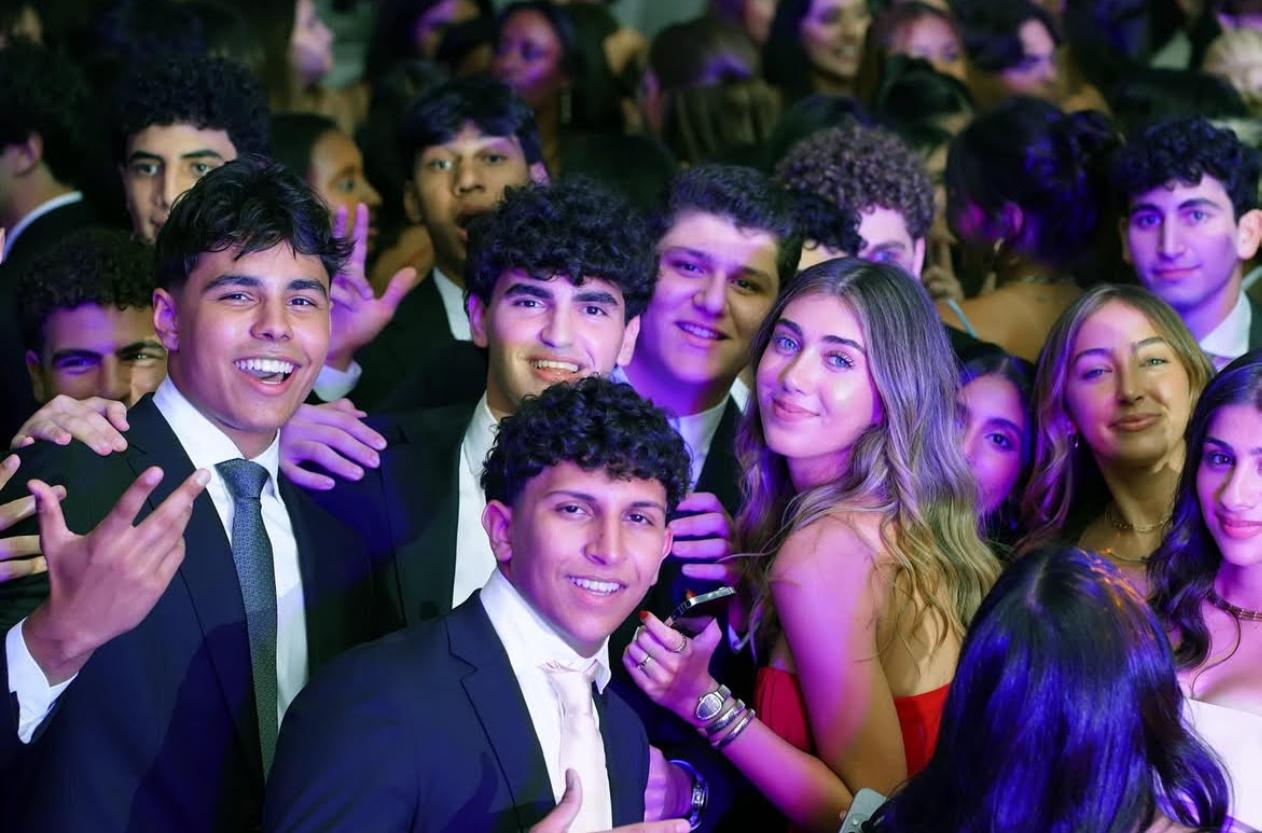
Source: American School of Dubai Instagram

Jamal Bazzari & Christine Ghantous:
How long have you been dating?
C: Almost two years now.
Do you want to be prom prince/ princess?
J: Why not? My sister Zaina was prom queen when she graduated in '22, so there’s a competition between us to see if I can do the same.
What qualities do you think make you a good contender?
J: I’m friendly and because of all my hobbies, I’ve gotten close to many diferent people.

Source: Saayeh Bahary

Source: Christine Ghantous
Saayeh Bahary & Omar Adas:
How long have you been together?
Omar: 2 years and 1 month
Do you want to be prom princess?
Saayeh: I never really thought about it, but yeah, I would love to.
Omar: Sure
What qualities do you think make you a good contender?
Saayeh: I'm really involved in a lot of school clubs and I’m a kind and thoughtful person. I'm honored to be considered.

Kiyan Vessali & Kenna Oden:
How long have you been together?
Kiyan: Almost 1 year
Do you want to be prom king/ queen?
Kenna: I don’t mind. If other people want it more, they can have it.
What qualities do you think make you a good contender?
Kiyan: Well, we're together. Which I think is a good one and we're nice.

Source: Ada Ozdemir

Source: Kenna Oden
Daniel Hennessey & Ada Ozdemir:
How long have you been together?
Ada: We’ve been together for two, almost three years now.
Do you want to be prom king/ queen?
Daniel: Yes, we really want to be king and queen as we have been together for so long.
What qualities do you think make you a good contender?
Ada and Daniel: We think we would be good contenders because we show the school core values, and we are a couple.
After reviewing the results, it’s clear that both the juniors and seniors favor tradition; both top predicted winners are real-life couples. These results show the long-established idea that prom royalty should be crowned as a duo, just like traditional kings and queens.
We also interviewed the head of the prom committee, Mr Ghassan, to get insight into his thoughts on this year’s prom court.
What qualities do you think royalty needs?
It would be nice if they embody the ASD attributes and values. It ends up being the cutest couple. There are a bunch of other superlatives that are being voted on.
Do you have any memorable moments from your high school's prom/crowning?
It was really nice to see my school campus transformed into diferent kinds of themes. it was cool to have a red carpet and see all the students arrive in their limos, as the teachers dressed up and lined up and clapped for them and taking pictures.








Source: Ghassan Gammoh

From what we’ve seen, being in a relationship often plays a big role in making it onto the Royal Court, and that trend seems to continue year after year. Still, with voting open to everyone, anything can happen on prom night. And this year, the crown went to Kenna Oden and Kiyan Vessali, proving that sometimes, simply being kind and genuine really does go a long way. Congratulations to our Prom King and Queen!
By:
All images from Amalia Myers Giraldo

April is Stress Awareness Month around the world, and is a time to recognize the impacts that stress can have on physical, mental, and emotional well being. Stress is a reality that ASD students have to live with everyday because of many varying factors, such as deadlines, managing work and extracurriculars, and personal life. The feeling of stress and distress is a very common occurrence for anyone, no matter the age, but with an overwhelming amount of it, stress can lead to many negative and immediate effects. During this month of awareness it is important to understand what can trigger stress, how it connects to mental health, and vital solutions to reduce these stressors, creating a healthier and balanced life.
Stress is a natural instinct, either a physical or psychological response to some sort of danger or challenge. It is a defense mechanism for protection and often happens when somebody is overwhelmed. According to Jeanne Segal, a Psychologist with a Master’s degree in Psychology, and a PhD in Sociology, the stress response is triggered by, “Your nervous system releasing a flood of stress hormones, including adrenaline and cortisol, which rouse the body for emergency action”. With the heightened nervous system, it can increase blood pressure, rapid breathing, and intense stress awareness. Stress can be a helpful mechanism that is naturally used depending on the situation, and can help with motivation or dealing with a life or death circumstance, but prolonged stress can have negative impacts on not only physical health, but also mental health. Eustress allows one to concentrate more effectively, work hard, and have adrenaline. Eustress is the type of stress that positively impacts life, but distress is the negative type of stress that can disrupt nervous systems in the body, creating triggers that constantly allow anxiety and irritation to increase. Although stress is a normal part of life and everyone experiences it, when it is constantly happening, this becomes chronic stress, and can be very overwhelming. Chronic stress can create negative behaviors that are detrimental to someone’s mindset, health, relationships, and heavily impact the quality of life. Stress is handled differently depending on each person and their personality. If someone loves the feeling of pushing themselves out of their comfort zone, they feel eustress, but if someone dislikes that feeling, they feel distress
Teenage years are a stage in life with many changes that can put immense pressure on the need to succeed academically, friendship dynamics, and social media. Teenagers go through years discovering their identity for the future, and with more independence and higher expectations, this can cause a lot of stress. It is vital that teens can understand the impact that stress can cause, and how to manage the stressors in their life to reduce the chances of chronic stress. The American Psychology Association found that the stressors for teens are just as much as adults. Unhealthy behaviors that are greatly connected to stress start to form earlier on in people’s life, like poor nutrition, lack of sleep, isolation, and irregular emotional bursts. The APA CEO and Executive Vice President Norman B. Anderson, PhD states that, “It is alarming that the teen stress experience is so similar to that of adults. It is even more concerning that they seem to underestimate the potential impact that stress has on their physical and mental health”. It is important to have the right support systems and spread awareness to the fact that too much stress is unhealthy for teenagers. Mental health issues like depression and anxiety are much more common in teenagers now, and have been increasing throughout the years. Stress is not the exact same thing as mental health problems, but they connect deeply. With chronic stress, it can turn into mental health issues that can affect physical and emotional well-being, and it can be harmful. A survey was sent out to all high school students at ASD, and with 79 responses, it clearly expressed that teenagers in our campus deal with distress. 83.5% of the students stated that they often or always feel stress, with 74.7% of the stress being directly related to school.
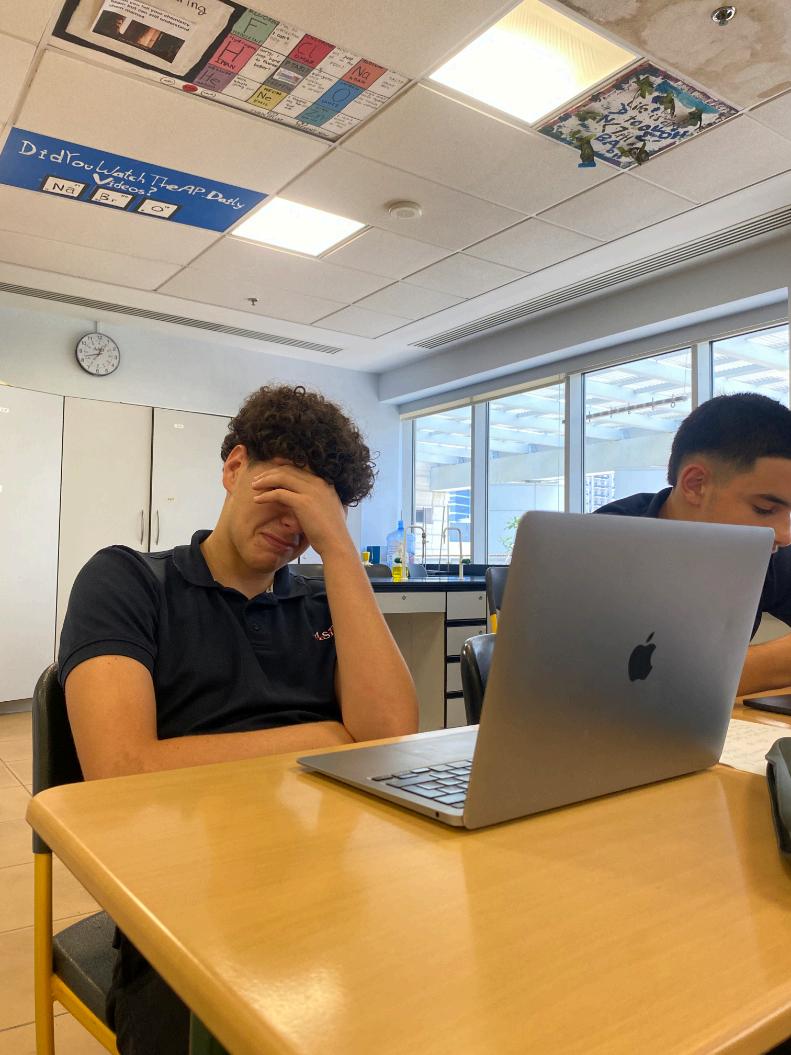
With the increase of mental health problems over the years, recognizing and being able to speak up on distress is crucial for teenagers to develop coping strategies that can prevent anxiety and depression. Nowadays, teens perceive that talking about mental health is weak and strange, but reaching out for help for chronic stress, and the mental health issues that arise from it is crucial to overcoming these problems. Out of the students who replied to the form, 63.3% think that stress and coping mechanisms should definitely be talked about more in the ASD community.
“ Everyone deals with stress differently and so it's really important to be aware and notice the way each student deals with stress. As in, it's important for teachers to be understanding but also make it clear that they are there to support you in any way needed ”.
Many of the students discussed that distress should be a prioritized topic of conversation, and especially because stress is an inevitable part of life, it is even more important to talk about coping strategies. By providing better support and mental health education, it increases trust within the community and can break the cycle of unhealthy behaviors.
Finding positive habits that support your interests while also diminishing distress is the most powerful way to increase overall health and happiness. Obviously, not everyone has the same interests, so discovering personal positive interests can lead to healthy habits. Exercising often allows for the release of endorphins, which are the hormones that relieve pain and stress from the body, and can also improve energy levels. Having a proper sleep schedule is very important, and establishing consistent routines allows the brain to function normally, giving it energy and allowing information that is being taught to be understood. Spending time outside can give a sense of peace and calm, and being surrounded by nature can truly help relieve depression, anxiety, and stressors. Maintaining a diet that is fueling and nutritious helps support the abilities to manage stressors by stabilizing energy, and giving strength to the body. Furthermore, artistic habits, such as writing and journaling, creating artwork, or even listening to music are great outlets to calm down and regulate stress. Finding strong connections and creating strong connections with friends, family, and even professionals can provide help and different perspectives. More recently, mindfulness strategies have been proven to effectively relax the body and mind, while focusing on positive energy. The mindset needed for meditation is one of the best ways to calm down and become aware of the present moment. There are two types of meditation, Mindfulness-based stress reduction (MBSR), which involves weekly classes that are filled with mindfulness exercises, and are taught through yoga. The
other being, (MBCT) Mindfulness-based cognitive therapy. According to the American Psychological Association, this type includes, “ a therapeutic intervention that combines elements of MBSR and cognitive behavioral therapy (CBT) to treat people with depression.” With these two methods of meditation and mindfulness, it improves positive mindsets and relieves stress, and it also reduces fatigue and pain which can lead to a better quality of life. According to the American Psychological Association, “Psychological scientists have found that mindfulness influences two different stress pathways in the brain, changing brain structures and activity in regions associated with attention and emotion regulation”. With these discoveries, meditation is a calming practice in which the acceptance of feelings and thoughts is necessary. Mindfulness therapy allows these beliefs to be put into actual practice, and frequently. Since chronic stress can lead to many physical problems or lead to feeling sick more frequently, mindfulness reduces that chance as well. Chronic stress can damage the body’s immune system, and with meditation, it lowers the stress response, reducing negative distress.
Stress is a natural part of life, and managing it is essential to improve wellbeing emotionally, physically, and mentally. Realizing the damages that distress can have on the body is a crucial step to overcoming it, and coping with stress depending on personal interests creates positive and life changing habits. Spreading awareness on this issue can also lead to a healthier life because stress should never be disregarded, but instead supported.
